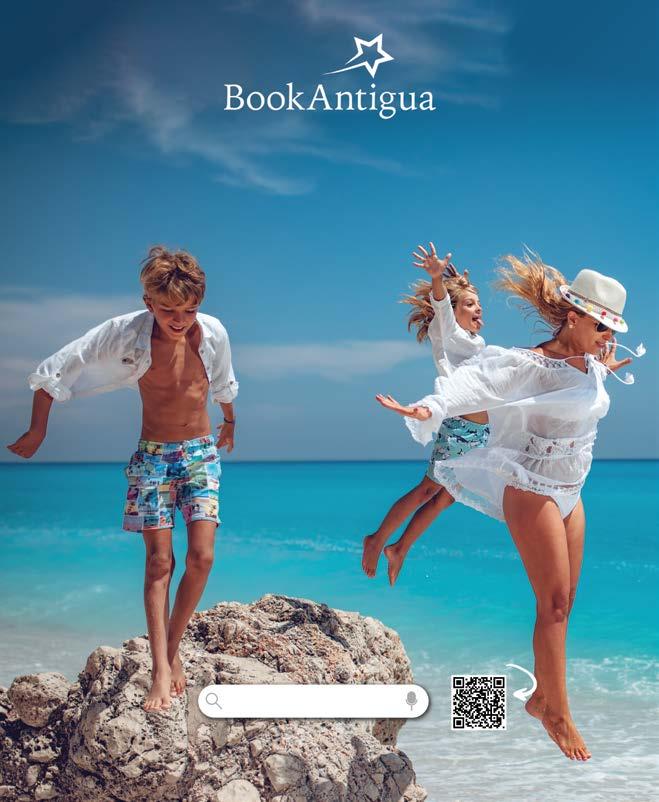
Convenient
On-time
Safe
Comfortable
Friendly






Convenient
On-time
Safe
Comfortable
Friendly




I welcome everyone who has chosen to become a citizen of our fair paradise. For those considering Antigua & Barbuda as their new country of citizenship, I applaud you for making a wise choice.
Antigua and Barbuda are two islands that comprise a single state, measuring 170 square miles, and populated by 100,000 citizens and residents. Barbuda measures 62 square miles and only 2,000 people reside there permanently. Yet, the most beautiful beaches, the most transparent turquoise waters and the only island in our Caribbean with a colony of frigate birds make Barbuda worthy of repeat visits.
My government decided to turn this undiscovered jewel-in-the-rough into a low-density destination for high-end income earners possessed of the resources to invest in luxury resorts and opulent condominiums.
For these reasons, the Peace Love and Happiness (PLH) Club has invested more than US$500 million in creating luxury housing, a challenging golf course, beautiful tropical gardens, and protective sand dunes that mimic nature in protecting the land from high-energy waves.
“The most beautiful beaches, the most transparent turquoise waters and the only island in our Caribbean with a colony of frigate birds make Barbuda worthy of repeat visits.”
The Nobu Restaurant and, upon completion, the Nobu Luxury Resort will attract many who will fly into Barbuda for a day to experience its gastronomic delights. The high standards of this brand will attract the most discerning of diners, and those with an appreciation for exceptional culinary experiences.
The magnificent and luxurious real estate developments take into account the need for private jets to bring their customers from North America or elsewhere to Barbuda. An international airport has been constructed to receive aircraft from virtually anywhere in the world so that the need to land in Antigua and then transfer to a smaller craft flying to a small landing strip in Barbuda is in the past.
A new deepwater port will allow for container ships to dock and discharge containers coming from Miami, Panama or Europe. Gamechanging developments are on the horizon.
I invite you to choose my island-country for your investment and for citizenship. The future is certain.

Honourable Gaston Browne
Prime Minister
BBig sisters can sometimes overshadow their smaller siblings, and this is arguably true for Antigua & Barbuda. Antigua, the largest of the two islands, has a population nearly ten times that of its sister island and boasts a developed infrastructure and a long-established tourism industry. It’s no wonder that Antigua is the betterknown and more frequently visited of the two islands. With its 365 stunning beaches, spectacular scenery, the UNESCO World Heritage Site of Nelson’s Dockyard, and fabulous hotels and resorts, Antigua is talked about the world over.
But Barbuda shines in its own way – and it shines bright. This small, pristine island offers a unique charm and tranquillity with a distinct vibe, landscape and feel from Antigua. With its famous pink beaches, impossibly turquoise waters and rich biodiversity, Barbuda is an untouched paradise and offers a glimpse into a more traditional Caribbean life. There is a reason why the late Princess Diana found solace and peace on the island. In fact, one of the island’s most beautiful beaches was renamed after her. The island is also home to the Frigate Bird Sanctuary, one of the world’s largest nesting colonies of frigate birds. And visitors shouldn’t be surprised to see donkeys, horses or deer roaming wild, making it a haven for bird watchers and nature enthusiasts alike.
With the new ultra-luxury developments on the horizon and the new airport soon opening, making the island easier to get to, Barbuda is about to step into the spotlight and is getting ready to be talked about a bit more.

Whichever of the two islands you choose to visit or reside in, you will not be disappointed. And rest assured, they are easily accessible with daily direct flights from major business centres in North America and London. The country also offers excellent education, good healthcare, a stable political situation, and a thriving economy.
If you decide to become a citizen of the islands, Antigua & Barbuda’s Citizenship by Investment Programme is ranked amongst the top three in the 2024 Henley Passport Index. Citizenship to the islands grants individuals a myriad of benefits, offering personal freedom, travel mobility, a second home and a plan B in geopolitical uncertain times.

THE CITIZEN, the official publication of the Antigua & Barbuda Citizenship by Investment Unit (CIU), is produced by Select Publishing with the full support of Charmaine Quinland-Donovan, CIU’s Chief Executive Officer and the Government of Antigua & Barbuda.
Publisher:
Managing Editor:
Creative & Art Director:
Susan Brophy
Marta Conceição
Advertising Designer: Danielle Jacobsen
Paulo Couto/Marta Conceição
Antigua & Barbuda introduction photo (pages 4 & 5): Michael Chandler/Barbuda Ocean Club
Photo credits: Andre Phillip, Michael Chandler/Barbuda Ocean Club, Antigua & Barbuda Tourism Authority, Getty Images/ICC, Coolidge Cricket Ground, Travel Antigua and Barbuda, Watkins Multimedia, Curtain Bluff, The Hut Little Jumby, Arton Capital, Yensa Werth, Visual Echo, The Royalton, Simply Antigua Barbuda, Danielle Jacobsen, Fer Ribes, Polina Kuzovkov/Unsplash, Deposit Photos, Shutterstock, Adobe.
Repro & printing: Lisgráfica – Impressão e Artes Gráficas
Circulation: 2,500
For all editorial and advertising enquiries, or to order a free copy, contact: select@select-publishing.com
The views expressed in the publication are not necessarily those of the CIU or the publishers. The publishers make every effort to ensure that the magazine’s contents are correct, but cannot guarantee the accuracy of any information published herein, or be held accountable for any errors, omissions, or claims for any damages.
All rights reserved. No part of this work may be reproduced or transmitted in any form or by any means, electronic or mechanical, without prior permission in writing from the publishers.
For Citizenship by Investment Programme (CIP) related enquiries, contact CIU at: info@cip.gov.ag www.cip.gov.ag

For Investment Migration Council (IMC) membership enquiries, contact the Regional Representative Office at: caribbean@investmentmigration.org www.investmentmigration.org

CiviQuo is the World’s First Investment Migration Marketplace. For enquiries, contact us at: info@civiquo.com www.civiquo.com

To access THE CITIZEN:

issuu.com/thecitizenantiguabarbuda

Susan Brophy Editor
t The Citizen, we’re proud to celebrate the landmark of our 20th issue. We want to extend a heartfelt thank you to all our contributors and readers for your continued support throughout our journey!
Antigua & Barbuda is a country that is constantly evolving, and Barbuda is a prime example. Often overshadowed by its larger sister, Barbuda’s natural beauty and wildlife make it truly unique. With new ultra-luxury developments and a brand-new airport, the island is drawing increasing international attention. Our cover story explores why Barbuda is a place like no other.
The Antigua & Barbuda Citizenship by Investment Programme (CIP) is also undergoing significant change. Charmaine Donovan, CEO of the Citizenship by Investment Unit (CIU) discusses these shifts and their impact on the region and investments in the country.
The Coolidge Cricket Ground is also set for transformation. The home of Cricket West Indies is thinking big and being redeveloped into a state-of-theart High Performance Centre that will not only attract athletes from across the globe but will also boost the local economy. Nelecia Yeates tells us more. Indeed, as the national sport, cricket stirs deep passion in Antiguans and West Indians. In June, the ICC T20 Men’s Cricket World Cup made history with matches played not only in Antigua and other Caribbean islands but also in the USA for the first time. Cricketing legend Sir Richie Richardson reflects on his experience in this landmark event and how the ICC aims to expand the game’s global reach.
Until its closure in 2020, LIAT was a veritable Caribbean institution. Thanks to a recent partnership between the Government of Antigua & Barbuda and Air Peace Caribbean, the newly renamed LIAT20 has risen from the ashes. CEO Hafsah Abdulsalam shares the airline’s ambitious plans and how it aims to regain its place as a symbol of Caribbean pride.
Christal Clashing is a force of nature. An Olympic swimmer and Atlantic rower, she’s now broken the country’s freediving record, all while battling the challenges of premenstrual dysphoric disorder (PMDD). We caught up with her to learn more about her fearless approach to life.
Bats may strike fear in many, but they are crucial to our ecosystem, playing a vital role in human health by controlling mosquito populations and contributing to the food chain through pollination. Our conservation feature takes a closer look at these unsung heroes of the night sky.
We also revisit Naydene Gonnella, one of Antigua’s most celebrated artists. She shares some of her fabulous pieces from her new collection: The Animals of the Chinese Zodiac, Endangered Animals and Pop Icons.
Jamaican-born Yohance Brown may be a banker by day, but his true passion is the great outdoors, particularly hiking in the verdant hills and photographing the island’s stunning landscapes. He shares some of his favourite shots of his adoptive island with us.
As usual, investment migration experts offer their insights and perspectives to us.
We hope you enjoy! Happy reading!
Is a legendary cricketer and iconic figure in Antigua. As a former West Indies captain, he played a pivotal role in cricket’s golden era. Post-retirement, he has become an ambassador for Antigua, promoting sports and tourism, while also serving as a representative for the International Cricket Council (ICC).
Is the Founder and Chairman of EC Holdings. He has been providing consulting and advisory services in real estate and citizenship by investment for over 15 years. Kevin is also a licensed agent and a frequent contributor, presenter, panellist, and workshop facilitator at immigration and real estate conferences globally.

Is an artist and writer who has lived in Barbuda for over 30 years. She runs the ArtCafe, a small business that sells her silk paintings, local crafts and food to visitors to the island. Throughout the years, she has contributed articles about Barbuda to many publications and writes the only Barbuda website, barbudaful.net.


Is the owner of Barbuda Cottages, a a boutique hotel on the island of Barbuda. She is dedicated to promoting sustainable tourism and preserving the natural beauty of Barbuda. Her work involves blending eco-friendly practices with luxury to provide the ultimate guest experience.

Is the founder and managing director of Reef View Enterprises Ltd. (RVE), Grenada’s premier local agent and a member of Forbes Business Council and Immigration Migration Council. After successfully serving over 3,700 clients, having the largest firm in the region is his next step in Caribbean domination.
Is one of the world’s leading international tax and immigration advisors and a published author in the field. David’s experience spans decades, and having first established his expertise in major law firms, today, he operates his own law firm and works as a private consultant advising ultrahigh-net-worth individuals and their families.
24 UP CLOSE & PERSONAL with Armand Arton thoughtleadershipguestwriters:KevinHosam(32)ColinBishop(34)

20 INTERVIEW with Charmaine Donovan CEO of Antigua & Barbuda CIU
28 OPINION by David Lesperance
42
T20 ICC WORLD CUP
A landmark event for globalising cricket with Nelecia Yeates
48 COVER STORY

64
PHOTOGRAPHY
Antigua through the lens of Yohance Brown



In a world filled with uncertainties, one of the greatest gifts you can offer your family is security and peace of mind.
The Antigua & Barbuda Citizenship by Investment Programme provides an opportunity to invest in a future that ensures stability and protection for generations to come.
With flexible investment options tailored for families, you can choose the pathway that best fits your needs, all while securing a brighter future for those you love most.
Invest in your family’s legacy with the Antigua & Barbuda Citizenship by Investment Programme.
www.cip.gov.ag

There are four types of investment which will qualify you for citizenship in the paradise islands of Antigua & Barbuda. As an applicant, you can choose between contributing to the National Development Fund (NDF), to the University of the West Indies Fund, purchasing property in a pre-approved real estate development, or investing in an approved business venture.
CONTRIBUTION TO THE NATIONAL DEVELOPMENT FUND
The NDF was established to fund income-generating public sector projects, innovation in entrepreneurship and approved charitable investments. It is audited by an internationally recognised accounting firm, and reports on its status are published each year. If this is your investment of choice, you are invited to contribute USD230,000 to the NDF, which is a onetime contribution for a family of four.
Contribution: US$230,000
Processing fees:*
Single applicant: US$10,000
Family up to 4 persons: US$20,000
For a family of 5 or more: US$20,000 plus US$10,000 per additional family member.
This investment option serves as a mechanism to finance the new University of the West Indies Five Islands Campus. This contribution will also entitle one member of the family to a one-year tuition-only scholarship at the UWI.
Contribution: US$260,000
Processing fees:*
For a family of 6: Included
For a family of 7 or more: US$10,000 per additional family member.
You and your family can obtain citizenship by purchasing a property in Antigua & Barbuda. You may also benefit from rental revenue with this investment. To qualify for citizenship under this option, you must invest US$300,000 or more in a designated, officially approved real estate development. You must own the property for a minimum of five years before selling it. At this time, the first owners may resell the unit or shares to a subsequent applicant as an eligible investment. No subsequent sales of the asset will be allowed under the programme.
Contribution: US$300,000
Processing fees:*
Single applicant: US$10,000
Family up to 4 persons: US$20,000
For a family of 5 or more: US$20,000 plus US$10,000 per additional family member.
The Citizenship by Investment Unit (CIU) secures approval for businesses, whether existing or proposed, from the Cabinet of Antigua & Barbuda for the purposes of investment in business under the Citizenship by Investment Programme (CIP).
There are two business investment options:
• Single investor investing at least US$1,500,000
• Joint investment of US$5,000,000 with no party investing less than US$400,000
Processing fees:*
Single applicant: US$10,000
Family up to 4 persons: US$20,000
For a family of 5 or more: US$20,000 plus US$10,000 per additional family member.
Please note that all four options also include a due diligence fee of US$8,500 for the main applicant, US$5,000 for spouse, US$2,000 for any dependent child between 12-17 years of age and US$4,000 for any dependent child/parent between 18-30 and 55 plus years.
* Processing fees for additional dependents, post-approval: US$10,000 for children from 0 to 5 years, US$25,000 for children aged 6-17 years and US$50,000 for adults aged 18 years and older. For a future spouse of the principal applicant, a fee of US$50,000 is payable upon application.
Why does Antigua & Barbuda have a citizenship by investment programme?
The programme was introduced to promote economic growth, attract real estate development, increase foreign direct investment, support the development of infrastructure and provide for a sustainable future.
What is the processing time?
Processing your application should take from 4 to 6 months.
Who can apply for citizenship?
To apply for the citizenship programme in Antigua & Barbuda, you must be at least 18 years of age, be of good character with no criminal record, and have good health.
Do I need to speak English to apply for citizenship?
You don’t need to speak English to be an applicant.
Who can be included in the application?
Your dependent children under 31 and dependent parents over 55 can be included within the application. *See definition of dependents below.
How do you conduct the due diligence and vetting of applicants?
All applicants must undergo an interview and rigorous screening prior to consideration by the Citizenship by Investment Unit. Complete applications will be forwarded to an international, unbiased third-party due diligence service provider who will conduct detailed background checks on all applicants before the application is approved. Checks are also conducted with international law enforcement agencies.
* Dependents are as follows:
A spouse of the main applicant; A child of the main applicant or his or her spouse who is 0-30 years of age; a child of the main applicant or of his or her spouse who is 18 years or older but who is physically or mentally disabled and who is living with and is fully supported by the main applicant; a parent or grandparent of the main applicant, or his or her spouse, who is 55 years of age or older and who is financially dependent on the principal applicant; a sibling of the main applicant, or of his or her spouse, if unmarried.
What happens once my application has been accepted?
A certificate of registration of citizenship will be issued and submitted to the passport office. Your authorised agent/ representative will forward your passports and Citizenship Certificate to you.
Do I need to travel to Antigua & Barbuda to complete the process?
The application process can be completed from your country of residence. Once your application is successful and you have received your passport, you must take your oath or affirmation of allegiance. You are required to visit Antigua & Barbuda for a minimum of 5 days within the first 5 years of acquiring citizenship, and you can take up full-time residence in Antigua & Barbuda at any time you wish.
Does Antigua & Barbuda recognise dual citizenship?
There are no restrictions on dual citizenship in Antigua & Barbuda.
For how many years will my passport be valid?
The passport will be valid for a period of 5 years and is renewable for a period of 10 years thereafter, provided that the requirements are met, which includes spending a minimum of five days in the country during this period after becoming a citizen.
In addition to the citizenship by investment programme, does Antigua & Barbuda have a tax residency programme?
Antigua & Barbuda does not currently offer a tax residency programme.
For future addition of dependents:
A future spouse of the main applicant. (A fee of US$50,000 is payable upon application); a future spouse of dependent children not older than 35 years of age; and a future child of a dependent child. (A fee of US$10,000 is to be payable for children from 0 to 5 years of age and US$25,000 for children 6-17 years of age).
For any additional questions, please contact an authorised representative, licensed agent or the CIU directly.

When making a serious decision, you need a serious team.


We are trusted local experts specialising in citizenship by investment as well as trusted real estate consultants in Antigua & Barbuda.
Investing in a second citizenship can help secure a better life for you and your family.
Whether for ease of travel, the diversification of your investment portfolio, personal and family security or simply a change of lifestyle, it unlocks a wealth of opportunities and paves the way to new horizons.
We are proud to celebrate 10 years of excellence. Trust us for your peace of mind. ww w.jam esa nd m a g i n l ey.co m
• Eugene Abbott: eabbott@abifinancialgroup.com ABI Financial Group: www.abifinancialgroup.com
• McAlister Abbott: mabbott@gcpantigua.com Global Citizenship Partners: www.gcpantigua.com
• Leslie-Ann Brissett George: leslieann@lbrissettlegal.com Leslie-Ann Brissett Legal Services: www.lbrissettlegal.com
• Sharon Cort-Thibou: legal@cortandcort.com Turnkey Antigua: www.turnkeyantigua.com
• Brian D’Ornellas: briandornellas@clientreferrals.com Client Referrals: www.clientreferrals.com
• Verlyn L. Faustin: verlyn.faustin@civesmundiinc.com Cives Mundi Inc
• Hollis E. Francis Jr.: info@heflawantigua.com HEF LAW: www.heflawantigua.com
• Thomas Francis: tfrancis0483@gmail.com Caribbean Concierge
• T.M. Rufus Gobat: rufus@cariblife.ag Caribbean Lifestyle Services: www.cariblife.ag
• Nigel Gore: nigel@blueprint-development.com Blueprint Development: www.blueprint-development.com
• Jason Hadeed: jason@gambitantigua.com Gambit Management Ltd: www.gambitantigua.com
• Gaye Hechme: ghechme@ilis.ag Island Living Investment Services Ltd: www.ilis.ag
• Julia Herbert: citizenshipsolutions@icloud.com
• Marian-Barbara Hesse: hesse@bhesseandassociates.com B. Hesse & Associates: www.bhesseandassociates.com
• Radford Hill: r.hill@lawhillandhill.com Hill & Hill Chambers: www.lawhillandhill.com
• Alan Hosam: hosama@candw.ag AH Consultancy Services Ltd
• Kevin Hosam: kevin@ec-holdings.com EC Holdings: www.ec-holdings.com
• Kelvin John: johnk@candw.ag Thomas, John & Co: www.thomasjohn.com
• Nuri Katz: nkatz@apexcap.org Apex Capital Partners: www.apexcapital.partners
• Stuart Lockhart: clerks@lockhartlegalchambers.com Stuart Lockhart Legal Services: www.lockhartlegalchambers.com
• Abire Mansoor: amansoor@citizensinternational.com Citizens International: www.citizensinternational.com
• Kirthley Maginley: kmaginley@jamesandmaginley.com James & Maginley Ltd: www.jamesandmaginley.com
• Elizabeth Makhoul: emakhoul@artoncapital.com Arton Capital: www.artoncapital.com
• Maya Mansoor-Khouly: elevatecitizenship@gmail.com Elevate Citizenship & Realty Ltd: www.elevatecitizenship.com
• Juliette Marcelle-Bailey: jbailey@jamesandmaginley.com James & Maginley Ltd: www.jamesandmaginley.com
• Andrea Roberts-Nicholas: andrea.roberts@robertscolaw.com Roberts & Co: www.robertscolaw.com
• Vanetta Rodgers: vcrodgers@avcocorp.com Avco Corporate Services Ltd: www.avcocorp.com
• Mei Tang: rmeitang@gcpantigua.com Global Citizenship Partners: www.gcpantigua.com
• Romell Tiwari: rtiwariantigualocalagent@usa.net AIT Management Services Ltd: www.aitms.ag
• Arthur Thomas: thomasa@candw.ag Thomas, John & Co: www.thomasjohn.com
• Joseph Warner: info@jdwconsultingantigua.com JDW Consulting Ltd: www.jdwconsultingantigua.com
• Robert Wilkinson: robert.wilkinson@ag.gt.com Grant Thornton: www.grantthornton.ag
• Stanley Yang: stanleyyang1993@gmail.com
One of Antigua & Barbuda’s most eagerly anticipated Citizenship by Investment developments is set to welcome its first guests next spring.
Moon Gate Hotel & Spa comprises 49-Suites set across seven buildings, each one offering stunning views over world-famous Half Moon Bay.
Headed by two Antiguan developers deeply passionate about the Caribbean island they call home, this low-density all-inclusive places wellness and sustainability at the heart of its operations.
Work is well advanced on the suites, along with Moon Gate’s spa, swimming pools, main a la carte restaurant and bar, lobby piano bar and plant-based bistro.
Because the project is approved under the government’s citizenship by investment programme, buyers can apply for an Antigua & Barbuda passport which offers ease of travel plus tax advantages.
Sales have been exceptional, well ahead of the April 2025 opening date, with most units already sold. Phase Two of the development is set to be launched imminently due to the high demand.
Moon Gate is a gentle stroll from the coral sands and turquoise waters of the Atlantic-facing beach. It occupies a tranquil location on Antigua’s quiet east coast, yet is just a half-hour drive from the V.C. Bird International Airport and 25 minutes from the hub of English Harbour.
The resort sets itself apart with a unique ‘barefoot chic’ vibe. Developers Gaye Hechme and Cameron Fraser are determined to create a community-minded space where guests can relax, unwind, and enjoy an authentic Antiguan experience. “We want genuine connectivity with our guests and our community,” Ms Hechme says. “We want guests to relax, unwind and get to know the real Antigua. This is a special place where they will be taken care of, where they can come and stay, and leave feeling rejuvenated.”
Investment Programme
with Charmaine Donovan, CEO of the CIU

Back in March 2024, the five heads of the countries operating CIPs in the OECS signed a memorandum of agreement (MOA) to integrate aspects of the programmes. Can you tell us more about what was agreed on and the main goals?
The ultimate goal of the MOA is the standardisation and strengthening of the administration of the programmes. Six main areas were focused on, which are:
1. Increasing the minimum investment threshold to US$200,000.
2. Formalising information sharing and the implementation of common transparency standards.
3. Establishing a regional regulatory body for the programmes.
4. Implementing common security screening and background checks framework.
5. Implementing common standards for regulating promoters and agents of the programmes.
6. Formalising joint capacity building for officials and programme operators.
What are the advantages of unifying the programmes for both the participating countries and potential investors?
Harmonisation strengthens the programmes and creates resiliency. The old adage teaches us that unity is strength. I note, however, that the OECS is no stranger to unification, as harmonised legislation, including the Banking Act and Insurance Act, have been in place for decades. Therefore, once implemented, these common standards will redound to more secure borders for the CARICOM region as well as for our international partners. Common standards will also attract a higher calibre of applicants to our programmes and thereby facilitate further investments in infrastructure, and skills and talents capacity in the individual countries.
Can you explain the new conditions and pricing systems of the Antigua & Barbuda programme?
The programme changes for Antigua & Barbuda became effective 1st August 2024. The legislative changes include:
”Antigua & Barbuda’s uniqueness of being the regional travel hub, the most developed OECS country, and having the most diversified opportunities available continue to make investing in the twin island state extremely attractive.”
• a further expansion of the definition of dependents, which increases the number of family members who are eligible for citizenship;
• allowance for a designated alternate principal applicant; in the event of incapacitation or death of the principal applicant;
• streamlining of application processing and due diligence fees, and;
• changes to the investment threshold for three of the four options as follows:
» Real Estate
US$300,000 Investment (previously US$200,000)
» UWI Fund US$260,000 inclusive of processing fees (previously US$150,000)
» National US$230,000 Development Fund (previously US$100,000)
How do these new conditions align with the other CIPs in the Caribbean?
The programme changes outlined above mainly address Agreement 1 of the MOA. Regional CIPs are collaborating, with the support of the Eastern Caribbean Central Bank and the OECS Commission, to implement the remaining five, which are actively being addressed. For instance, we have agreed on the treatment of denied applications; applicants denied in one country will be denied in all five countries. Additionally, the first step towards the establishment of a regional regulatory body has been taken with the identification of the members of the interim committee charged with moving this process forward. Furthermore, our regular meetings ensure our continued fervour and commitment towards the achievement of the unified desired outcomes.
The programme is now more expensive than it was previously. What advantages does making Antiguan citizenship more ‘exclusive’ offer to both applicants and the nation?
Given that the common minimum investment threshold has become effective, there is little difference in the financial outlay required by potential applicants to each
programme. Antigua & Barbuda’s uniqueness of being the regional travel hub, the most developed OECS country, and having the most diversified opportunities available continue to make investing in the twin island state extremely attractive. Additionally, the Antigua & Barbuda CIP has had a track record of integrity and consistency; features which have become highly sought after in the investment migration industry. The finalisation of the comprehensive software upgrade will also enhance applicants’ experience with our programme.
How do these changes address the concerns of nations that have been critical of the citizenship by investment industry?
Our international partners have been concerned about gaps in the administration of some programmes, which present increased risk to their borders given that the passports of these countries allow visa-free access to their borders. Concern has also been expressed about the risk of inadvertently facilitating illicit transactions due to an ineffective vetting process.
The characterisation of the “race to the bottom” is being addressed by the ongoing implementation of the components of the MOA. Unification of the processes and standards means that the operators will approach the administration of their individual programmes similarly. Additionally, common training for programme operators and information sharing on applicants to the regional programmes support a more thorough and consistent assessment of their eligibility. Enhancing the vetting process ensures that the risk to the borders and the risk of facilitating illicit transactions are mitigated.
Is there anything else you would like to add?
Antigua & Barbuda’s CIP has demonstrated that integrity and consistency are key components of resilience. We will continue to forge forward, ensuring realignment of programme features with global trends in a bid to remain relevant and attractive. We will not compromise on our standards which are at all times influenced by international best practices.
Searching for a brighter, more secure future? Come to my beautiful twin island state – Antigua & Barbuda!

Through citizenship to Antigua & Barbuda, you are opening doors to new horizons - not just for yourself but for your loved ones.
This is more than an investment in a passport - it’s an investment in opportunities, access to quality education, healthcare, and the ability to build a life rooted in peace, stability, and global mobility. Your own Plan B.
Safeguard your family’s legacy with the Antigua & Barbuda Citizenship by Investment Programme.
www.cip.gov.ag

"Antigua & Barbuda is
among the most beautiful places on Earth and the ideal destination for investors to realise their Caribbean dreams and access a new life for themselves and their families."
What spurred your initial interest and passion for the citizenship by investment industry?
My passion for the industry is deeply rooted in my personal journey. I was born in communist Bulgaria in 1976 before relocating to Morocco as a child with my parents. In an era before the Schengen Area existed, our travels involved navigating through 14 different countries, each with its own visa requirements and bureaucratic hurdles. We were treated differently at borders compared to those with a European passport. I saw firsthand what an arduous process such travels required, but more importantly, I realised that your passport can both hinder and facilitate opportunities across the globe. When the Berlin Wall fell, my family and I were able to emigrate anywhere we wanted. Upon moving to Canada at 14, I developed an interest in finance, eventually becoming one of the youngest licensed financial brokers at just 17 years old.
The ‘lightbulb’ moment for me came when I discovered the Canadian Immigrant Investor Programme, which allowed foreigners to invest in a specific bond to receive residency rights in Canada. This combined all of my passions: innovation in finance and unlocking personal freedom. I knew there were millions of people out there with a similar background to me who could utilise this opportunity and had a lot to offer their host country. I applied to become an approved broker with the Canadian government and then began my own firm, Arton Capital.
What do you consider the most pressing issue in the industry today?
How would you like to see the industry evolve going forward?
Increased cooperation, innovation, and regulation within the industry are needed now more than ever to ensure this industry remains sustainable. How we have operated in the last 20 years cannot be how we operate in the next twenty. Unilateral action from firms must be replaced with a coordinated and cohesive effort to improve our industry. This could involve information sharing through industry-wide forums and partnerships to navigate challenges and capitalise on emerging opportunities collectively.
Accountability, transparent reporting, and effective regulation will also be key to fostering trust and aligning with lawmakers, ensuring we continue to meet the highest standards and address the needs of our stakeholders. By embracing these principles, we can create a resilient and forward-thinking industry that benefits everyone.
Governments can do more to tailor their schemes to ensure that the foreign investment they generate is being used most beneficially. This is an area the Caribbean is leading in. For example, Antigua & Barbuda’s CIP channels capital toward the University of the West Indies. Europe can learn from the Caribbean’s tailoring of CBI programmes rather than the short-sighted decision to close programmes taken in some states, such as Spain. Moving investment away from oversaturated regions and sectors and towards areas such as government bonds, infrastructure projects, and education/conservation initiatives, for example, is one avenue governments can pursue to ensure both investors and host citizens benefit from the schemes.
More broadly, the mobility industry will evolve as technology advances.
What books are you reading, and which ones have inspired you most?
I want to enable the mobility of over a billion people, but that won’t be achieved through citizenship by investment alone; it will be achieved through developments in emerging sectors such as AI and blockchain.
Crucially, government support is paramount in altering the perception of migration to establish a truly global citizenry. I recently attended the United Nations Small Island Developing States (SIDS) Conference in Antigua & Barbuda, proposing the signing of a groundbreaking multilateral visa-free agreement: The St. John’s Accord. If signed, this deal would see each SIDS grant citizens of other states in the bloc visa-free travel. This is the key to unlocking economic opportunity for millions, allowing individuals to live, travel, and work more freely than before.
I can’t put down The Wealth Money Can’t Buy by Robin Sharma. It’s a philosophical book that offers a life-changing outlook on how to lead a fulfilling lifestyle. Based on his ‘8 Forms of Wealth’ learning model, it teaches people how to have a more rewarding time on this Earth.
At the start of my career, I read Robin’s The Monk Who Sold his Ferrari, and it left a profound impression on me, teaching me how to use my life and help others.
Who is the person who has influenced you the most in your life and career?
How would you appease critics of CBI programmes?
I would point to Robin Sharma again. I have read his books for over a decade and am lucky to consider him a close friend. In 2013, I launched the Global Citizen Forum, a non-profit gathering of international leaders that looks to address worldwide issues through the power of global citizenship. The following year, we hosted Robin at the Forum, where he shared his wise words on how anyone can become a leader and inspire those around them.
Critics need to understand the multitude of benefits these schemes offer to both investors as well as the citizens in the host nation. In Antigua & Barbuda, for example, High Net Worth Individuals can acquire citizenship by contributing to the National Development Fund or purchasing governmentapproved real estate.
CIPs also contribute over 50 percent of several Caribbean nations’ GDP, enabling them to compete in a hostile international market. Whilst some states may export natural resources or sell the products of their industries, the Caribbean does not have this luxury, forcing them to sell their islands’ appeal as a destination. This has made criticism so surprising. Closing their CIP threatens to remove a key element of their economies without an adequate replacement. And why should they? CBI programmes have proven to be a vital tool for their economic and social prosperity.
What would you say to anyone thinking about pursuing citizenship or investing in Antigua & Barbuda?
What is your favourite spot in the twin islands?
Firstly, you’ve made the right decision! Antigua & Barbuda is among the most beautiful places on Earth and the ideal destination for investors to realise their Caribbean dreams and access a new life for themselves and their families.
There are too many to choose from. For me, a perfect day is waking up in Jumby Bay before having lunch at Nobu in Barbuda. Then, it is walking across the pink sandy beaches of our soon-to-be-launched Rosewood resort before settling down for dinner at Cecilia’s High Point Café.
by David Lesperance Founder and Principal Lesperance & Associates

What is the real motivation of the EU, UK and US in trying to dictate other countries on using citizenship or residence as an economic tool?
June 2024 marked both the implementation of a multi-jurisdictional Caribbean price increase and a hearing by the EU on Malta’s accelerated naturalisation programme. Journalists, lobbying entities, and politicians in the EU, UK and US argue that CBI programmes are being exploited by individuals involved in criminal activities, money laundering, terrorism, or spying (aka ‘scoundrels’).
They state with certainty that these scoundrels will use the acquired citizenship as a means to evade law enforcement, gain access to sensitive information, or engage in money laundering or hiding proceeds of crime.

AAs readers of The Citizen know, there are a number of entirely legitimate reasons why someone would be interested in obtaining a second citizenship and passport through investment (CBI). These motives might include seeking a better travel document or executing a US expatriation or nonresidence in other countries' tax plans. Other common motives are to ensure mobility during pandemics or should their current passport be cancelled by home country authorities because they decided to move abroad or for political reasons.
Over the last few years, the UK and the EU have used their ‘tool of scoundrels’ reasoning to either cancel visa-free travel or to impose new criteria on Caribbean CBI programmes to maintain their current visa-free travel privileges. However, when examined, their stated objections lack any merit. To prove my point, one need only look at the logical decisionmaking process of a typical scoundrel.
Scoundrels know that all the Caribbean CBI programmes require thorough background checks and due diligence to ensure the country weeds out any individual with a questionable background. Furthermore, this due diligence process adds several months to the process of acquiring a CBI, resulting in total processing times in excess of six months or more. Finally, once all the costs are calculated, a Caribbean CBI now generally costs in excess of US$250K.
Knowing that they are well aware of these realities, let us look at the options available to a scoundrel who is interested in acquiring a second passport.
Option one: Purchase a Caribbean CBI: Pass a detailed due diligence; cost in excess of US$250K and wait a minimum of six months plus for a travel document which does not allow them to live in Europe or North America.
Option two: Purchase a fake first-world (e.g. EU, UK, US, Aus, NZ) passport which has been put into that country’s registry: No due diligence; cost approximately US$7,500; processing time approximately ten working days to secure a travel document that has extensive visa-free travel and the ability to live in Europe or North America.
Option three: Purchase a stolen first-world passport: No due diligence; cost approximately US$13,500; processing time approximately ten working days to acquire a travel document with extensive visa-free travel and the ability to live in Europe or North America.
Option four: Purchase fake lineage documentation to support a claim for a real citizenship/ passport in a first-world country: No due diligence; cost approximately US$5,000; processing time of 12 to 24 months (depending on the country) to acquire a travel document that has extensive visa-free travel and the ability to live in Europe or North America.
For scoundrels, it is abundantly clear that purchasing a Caribbean CBI will never be a consideration. This is especially true for money launderers opening accounts. They would need to use their new passport to go through a bank KYC/AML review that is FATCA and CRS compliant. Their Caribbean CBI passport will always have their original country of birth, which will result in the financial institution automatically asking for additional documentation to pass their due diligence process.
For those who correctly point out that scoundrels have previously sought and received CBIs, I would note the following:
• Some jurisdictions did poor due diligence and are being rightly criticised.
• Some scoundrels got their CBI before there were any criminal charges or red flags that would have turned up in a due diligence check.
• Due diligence checks have significantly improved over the last few years.
So, if use by scoundrels is not a viable reason for opposition by the foreign governments to Caribbean CBIs, what is the real motivation? Some have theorised that this hostility is a remnant of colonialism. There may be some truth in this, but this argument is somewhat undermined by the EU's opposition to residence by investment programmes in non-colonised EU countries like Portugal, Greece, Italy and Spain.
My own theory is that politicians are emotionally repulsed by the idea that another nation would exercise its sovereign right to attract foreign direct investment through CBI. If I am correct, then ultimately, there is nothing, short of closing their CBI programmes, that will appease these foreign politicians. Until that goal is reached, they will hold the sword of Damocles over the heads of those countries which operate a CBI programme by threatening to withdraw visa-free travel.
Given this reality, what is the future of Caribbean CBI programmes? It is worth acknowledging that those who acquire Caribbean CBIs for the legitimate reasons outlined previously are, by definition, wealthy enough to easily secure UK, US or Schengen visas. Therefore, the real question of the future of the programmes rests with the local voters.
As voters head to the polls in any election, their vote for Politician A (who supports CBI) or Politician B (who wants to abolish it) will depend on that voter's perception of whether the benefits of CBI to them (vs developers or the government), outweighs the hassles they now face in getting visas.
It is worth understanding that with prior visa-free travel, voters could simply book a ticket at the last minute. If visa-free travel is withdrawn, they would need to plan their trip well in advance, book an appointment, travel to another island to apply (as there is probably not an embassy/consulate on their small island) and pay a fee to apply. In addition, they will not be able to book their flight or know they can travel until they have the required visa in hand.
Smart politicians will do everything in their power to show the value of the direct foreign investment of CBI to their voters. At the same time, they will go to extraordinary lengths to try and make the acquisition of UK and Schengen visas as easy as possible. This might include having their government pay to regularly fly in foreign officials for visa appointments.
Those politicians who put in the effort to win over voters on the value to their island of a CBI programme will continue to benefit from the significant revenue their programme generates. Those who do not may see their programmes killed by the politicians who replace them. The surviving ones will then have less competition.











































by Kevin Hosam Founder & Chairman EC Holdings
he citizenship by investment (CBI) industry, particularly in the Caribbean, has demonstrated an exceptional ability to rebound from global disruptions. Recent price increases in these programmes might seem significant, but they signal a period of evolution and strategic refinement, a reflection of the strength of the industry. My colleagues within the industry might raise an eyebrow at ‘strategic refinement’, but hopefully, after reading this article, it comes full circle into perspective.
Despite challenges ranging from geopolitical tensions to health crises, the Caribbean CBI sector has shown remarkable resilience. This article explores the Caribbean CBI industry’s recovery trajectory, its advantages over other regions, and how the programmes have adapted to changing demands while upholding rigorous standards. The resilient nature of CBI programmes: The CBI industry has historically weathered a variety of global crises, from wars and economic downturns to pandemics. Its enduring appeal lies in its benefits to ultra-high-net-worth individuals (UHNWIs), which includes personal security, tax advantages, new business opportunities, and enhanced global mobility. The industry’s capacity to rebound from setbacks is rooted in its intrinsic value to investors who seek to diversify their assets and safeguard their futures. The more unsafe and subdued the world becomes, the more people require a contingency plan - a plan B!
Over the years, many attacks on our programmes have come from sensationalist media outlets and legislative politicians, particularly from the East. These criticisms often gained traction in similar media circles, but they were typically driven more by ideology and self-promotion than by genuine security concerns.
Recent adjustments in CBI programme prices, while notable, reflect the industry’s ongoing adaptation to evolving market conditions. They also supposedly align with broader economic trends and, of course, the growing demand for citizenship through investment.

“The
Caribbean CBI programmes are poised for continued growth, driven by their enduring appeal to UHNWIs
and their strategic responses to evolving global conditions and geopolitical influence.”
Recent developments: A notable development in the Caribbean CBI sector is the recent Memorandum of Agreement (MOA) signed by five Caribbean nations. This agreement, finalised last March, includes several key changes but most notable are the increased investment thresholds and the alignment of programme features. This agreement aims to protect the longevity of the Caribbean CBI industry while improving programme quality. The recent memos published by the five Caribbean CBI programmes notably show their intention to uphold rigorous due diligence standards. While the higher investment levels are designed to attract top-tier applicants and support the programmes’ long-term viability, it is well-publicised that the Caribbean programmes are also trying to eliminate underselling and finance schemes that have plagued the industry for the past three or so years. Still, only time will tell if this price increase will stop or slow this trend. However, before getting judgmental to the Caribbean, these schemes are not new to the industry, but rather they are well known in the larger programmes worldwide long before they reached the beautiful shores of the Caribbean. Anyway, this is another topic for another time.
Evolution and inclusivity of CBI programmes: Caribbean CBI programmes have evolved significantly over time, becoming more inclusive while maintaining stringent due diligence protocols. This evolution reflects the sector’s responsiveness to changing investor needs and global trends:
1. Greater accessibility: Modern CBI programmes have introduced more flexible and accessible application processes. This includes a range of investment options and tailored packages designed to meet the diverse needs of investors.
2. Stringent due diligence: Despite increased inclusivity, Caribbean CBI programmes have remained committed to rigorous due diligence. This involves detailed
background checks, financial scrutiny, and verification processes (the recently introduced interview) to ensure that applicants meet high standards of integrity.
3. Programme enhancements: Caribbean CBI programmes have continuously adapted to market demands and offer the fastest direct path to a second citizenship.
Future outlook: The future of the Caribbean CBI industry looks promising as it continues to adapt to global trends and investor expectations. The recent price adjustments and programme alignments reflect a strategic approach to maintaining the sector’s competitiveness and sustainability. As global demand for CBI programmes persists, the Caribbean’s unique advantages will likely ensure its continued prominence in the market or until there is something similar, which also offers a second citizenship at a competitive price within a reasonable timeframe. Security agencies in Western Europe and North America have thoroughly assessed the Caribbean CBI programmes and determined that these programmes pose no significant risk. Therefore, investors seeking CBI opportunities will find the Caribbean’s offerings increasingly attractive due to the region’s historically favourable tax regimes, political stability, business prospects, and enhanced global mobility. The industry’s ability to recover from past challenges and its commitment to maintaining high standards of due diligence will further solidify its position as a leading destination for citizenship by investment.
In summary, while recent developments in the Caribbean CBI sector signal important changes, they also highlight the industry’s resilience and adaptability. The Caribbean CBI programmes are poised for continued growth, driven by their enduring appeal to UHNWIs and their strategic responses to evolving global conditions and geopolitical influence. As the sector recovers and evolves, it remains a vital option for investors seeking to secure their future and optimise their global positioning.
by Colin Bishop Managing Director Reef View Enterprises
n the face of the escalating effects of climate change, sustainable development is no longer just a buzzword - it’s becoming a global necessity. There is now a deafening call for industries across the globe to rise to the challenge of reassessing their practices and embracing green initiatives at every level of their business model to support sustainable economic development and job creation. Over the years, citizenship by investment (CBI) programmes have focused on the creation of viable business ventures in a number of productive and developmental sectors; therefore, they have the potential to emerge as significant advocates for green growth. By strategically aligning citizenship programmes with green initiatives, countries can not only attract investment but also foster eco-conscious development. Here’s how, in my opinion, the citizenship by investment industry can contribute to the crucial journey towards sustainability:
I believe these investments not only bolster the nation’s energy independence but also contribute to global efforts in combating climate change, and by incentivising investors to allocate funds towards renewable energy infrastructure, CBI programmes can significantly accelerate the transition to a low-carbon economy. In a recent poll, 61 percent of interviewees across ten European countries indicated that they would be likely to join a renewable energy cooperative if one was set up in their local area (European Climate Foundation, 2021). Imagine an investor coming into the Caribbean to set up a renewable energy cooperative that could get more citizens involved in integrating renewable energy into their everyday lives. This is a means of combatting the strong criticisms the industry receives in the UK and EU.
Beyond energy, CBI-funded projects can prioritise sustainable infrastructure development. This includes initiatives such as green building construction, efficient public transportation systems, and eco-friendly urban planning. By integrating environmental considerations into infrastructure projects, countries can minimise their ecological footprint and enhance resilience to climate change impacts. Moreover, sustainable infrastructure enhances the quality of life for citizens and attracts

“The citizenship by investment industry holds immense potential to catalyse green growth and sustainable development, departing from the mindset of legal citizenship to sustainable citizenship.”
This presents the opportunity for citizenship by investment projects in the Caribbean in tourism, agriculture, construction and manufacturing to weave climate adaptation measures at all levels of their business, including the use of renewable energy, rainwater harvesting, water efficiency technology and sustainable building construction. For example, CBI projects can ensure that recognised green building standards, such as Leadership in Energy and Environmental Design (LEED) or Building Research Establishment Environmental Assessment Method (BREEAM), are being followed.
environmentally conscious residents and businesses. For example, Six Senses, a company keen on sustainability by design, recently completed its luxury hotel project in Grenada and incorporated its villas into the land’s topography rather than changing it.
Many countries offering citizenship by investment are rich in biodiversity and natural resources. CBI funds can be directed towards conservation efforts, including the establishment and maintenance of protected areas, reforestation projects, and wildlife conservation programmes. By preserving ecosystems and biodiversity hotspots, these investments safeguard valuable natural heritage and support ecotourism initiatives, providing sustainable economic opportunities for local communities.
Agriculture is a significant contributor to greenhouse gas emissions and environmental degradation. Through CBI-funded projects, countries can promote sustainable agriculture practices and agroforestry initiatives. This includes investments in organic farming and sustainable land management techniques. Countries can mitigate deforestation, soil erosion, soil nutrient depletion, and water pollution by prioritising regenerative agriculture methods while promoting food security and rural development.
Beyond financial investments, the CBI industry can contribute to green growth by promoting environmental education and awareness. Countries can allocate funds towards environmental literacy programmes, sustainable development initiatives, and community engagement efforts. By fostering a culture of environmental stewardship, CBI programmes can empower citizens to actively participate in conservation efforts and adopt environmentally friendly behaviour in their daily lives. Citizenship by investment projects touch a wide crosssection of sectors. Therefore, their impact on green growth can be exponential. However, investors must be educated and guided on how their projects can make an impact. CBI firms must play this crucial role and adopt similar principles to ensure that investors are fully informed about the projects available to them. In the case of a real estate investment pathway offered by many countries, CBI firms should provide investors with comprehensive information regarding the sustainability of each project under consideration.
In conclusion, the citizenship by investment industry holds immense potential to catalyse green growth and sustainable development, departing from the mindset of legal citizenship to sustainable citizenship. By leveraging CBI funds to support renewable energy, sustainable infrastructure, conservation, agriculture, climate resilience, and environmental education, countries can simultaneously attract investment and advance green objectives. As governments and stakeholders increasingly recognise the urgency of addressing climate change, integrating environmental considerations into citizenship by investment programmes becomes not just a choice but a moral imperative. Through strategic alignment with green growth principles, the CBI industry can emerge as a powerful force for positive change, driving a transition towards a more sustainable and resilient future for all.




WhenLIAT74wentintoreceivershipin2020,heartsacrossthe Caribbean were broken over the loss of an institution that had providedeaseoftravelacrosstheregionforover60years.
ThankstotheeffortsofGastonBrowne’sgovernmentanda partnership with Air Peace Caribbean Ltd, a new and revitalised airline,LIAT(2020)Ltd(LIAT20)hasrisenlikeaphoenixfromthe ashes.Withamissiontofosterconnectionsamongpeopleand placeswhileensuringsafeandreliableflightservices,theLIAT brand is back and better than ever. We sat down with CEO Hafsah Abdulsalam to learn more about the airline’s ambitious plans and what the future holds.
Now that LIAT is back in the skies, what are your immediate and medium-term priorities?
Our main priority is to restore reliable, efficient, and safe air connectivity across the Caribbean, regaining the trust and confidence of the travelling public. How do we plan to achieve this? Simple - to deliver consistent, high-quality service. Our main priority is to focus on expanding our routes and building a robust network across the Caribbean to enable same-day travel from north to south, which will fulfil the core of our value proposition.
To achieve our mission, we recognise that we need the right resources to provide the quality of service that we promise. This includes people, infrastructure equipment, and the type of aircraft we deploy. All these resources come together to create value by strengthening our operational delivery, ensuring that we first maintain a safe operation - our number one priority -in an efficient manner, which should translate to customer satisfaction. These are the core elements of our strategy in our first year of operations.
Additionally, we’ve centred our strategic plan around three key areas: streamlining, consolidating and stabilising our operations, such that by the end of year one, we aim to have reached operational and financial stability.
“Our key differentiator is our value proposition – the ability to travel north to south in one day. No other airline in the region offers same-day travel from north to south. We see this as a crucial gap in the market.”
Can you tell us about the routes you are currently offering and your plans to increase these?
Currently, we fly to Dominica, St Lucia, St Kitts, and Barbados, with Antigua also in the mix. That’s five destinations. We’ll soon be adding flights to Tortola, St Vincent, and St Martin. All of these routes will be operational by October. In November, we’ll add Trinidad and Guyana, and by December, we plan to include the Dominican Republic and possibly Jamaica.
We aim to gradually cover more of the region, and by December or January, we should have a much more comprehensive route network. As stated earlier, the ultimate goal is to enable passengers the ability to travel

We’re even looking further afield. Once our regulator, the Eastern Caribbean Civil Aviation Authority (ECCAA), regains its Category One license and can fly to American territories, we plan to fly to St Thomas, Puerto Rico, and
You are very ambitious in your plans!
Yes, we’re ambitious! We’re not just playing within the regional space. Flying to Miami will make us a direct competitor with airlines like American Airlines and Caribbean Airlines, and we’ll also establish a secondary hub in St Vincent to strengthen south-to-south connections. Another hub is planned for Guyana, which will connect the southern Caribbean to
Although this forms part of our mid to long-term strategy, this is something I haven’t made public until now. We will also continue to evaluate market demand and look for solutions to bring even more islands into the fold, adjusting our route plans as necessary.
Will these plans require larger aircraft?
Yes, we plan to introduce a narrow-body aircraft, specifically the new generation Embraer E2195, which complements our current fleet of Embraers and ATRs.
How many aircraft do you currently have?
Right now, we have three aircraft: two ERJ 145s and one ATR. Within the next three months, we plan to expand to six aircraft - three ATRs and three ERJ 145s. By the end of our first year of operations, we’ll also be introducing our first narrow-body aircraft as I just mentioned, which has a capacity of around 128 seats.
Can you tell us about the importance of customer service in LIAT20?
Customer service is at the core of our mission. Our mission statement is about fostering connections between people and places while driving regional growth, but we also focus heavily on delivering on-time performance and an exceptional customer experience.
This means that every customer touchpoint - from purchasing a ticket online to interacting with our customer experience agents over the phone, at the airport, or onboard our aircraft – should provide a high-quality experience for both our customers and prospective customers. It’s about ensuring things work seamlessly for customers, whether it’s ensuring our website functions smoothly or resolving issues with a one-call solution when they ring our customer experience centre.
We’ll also strive to ensure that we maintain schedule integrity, so customers can rely on our commitment to them. When we say we’ll fly at a certain time, we must commit to it. This is what ‘exceptional customer experience’ means to us.
Do you offer VIP services?
We offer VIP services for passengers who want the flexibility of private travel without the high cost of a private jet. We can provide bespoke services tailored to their needs, offering a personalised experience with our friendly flight crew.
We already provide charter services, and we’ve flown musicians, cricketers, and even prime ministers. We also offer group travel solutions. For example, we worked with the Netball Association to coordinate travel for teams from Anguilla, Antigua, and Grenada to a tournament in St Lucia without disrupting our regular schedule.
We offer competitive and flexible travel solutions for all kinds of clients, including corporate groups.
Are there plans for long-haul flights?
Yes, we want to fly to the UK, but obviously, that’s not something we’re planning to do immediately. We’re taking a phased approach, starting with intraregional travel, then expanding to Latin America, Miami (subject to ECCA regaining Cat 1 status) and eventually London.
As stated at the start of the interview, LIAT20 is a joint venture between Air Peace Caribbean Ltd and the government of Antigua. However, with the extended relationship with Air Peace Nigeria, who have plans to fly into the Caribbean, LIAT20 will serve as a regional distributor for those passengers. So, watch this space; we may even operate our own flights to the Motherland one day! There are so many possibilities of what our service offerings may become. I think it’s very exciting.
Can you tell us more about Air Peace and how their network can work with LIAT20?
Air Peace Nigeria Ltd is the largest privately owned airline in Africa. They operate flights not only in Nigeria, West, East, and Southern Africa but also internationally to destinations like the UK, China, India and Saudi Arabia, with more international destinations in the pipeline. We plan to leverage passenger movement through the established routes and reputation that Air Peace Nigeria has built across Africa, which could open up exciting additional possibilities for LIAT20.
In addition to our partnership with Air Peace, we’re also exploring potential partnerships with other carriers to enhance our service offerings. So, with a LIAT20 ticket, you could eventually connect to places as far as India.
What would you say is LIAT20’s key differentiator?
I would like to reiterate that our key differentiator is our value proposition – the ability to travel north to south in one day. No other airline in the region offers same-day travel from north to south. We see this as a crucial gap in the market.
Any final message?
I want to urge everyone in the Caribbean to consider LIAT20 as their first choice for travel to our available destinations - LIAT20 is your airline. We also value every feedback and strongly encourage this, as it helps us enhance our services and provide the best experience possible.
by Sir Richie Richardson

SSince the first tournament was held in South Africa in 2007, the ICC T20 Cricket World Cup hasn’t failed to bring excitement and drama to cricket fans worldwide. This year, the ninth edition of the men’s tournament was even more special as it was hosted jointly by the West Indies and, for the first time,
the United States. As someone deeply involved in cricket, I can confidently say this was a massive step forward in the ICC’s efforts to globalise the game and introduce cricket to new audiences. T20 cricket, introduced in 2003, revolutionised the game by offering a shorter, more dynamic version that
appeals to both traditional fans and new audiences. The format, with its emphasis on aggressive batting, quick scoring, and strategic bowling, has made cricket more accessible and thrilling, especially for younger viewers. As a former cricketer, I’ve seen firsthand how T20 cricket has transformed
"This year’s T20 World Cup was more than just a tournament; it was a pivotal moment in the history of cricket."

the sport. The shorter format has levelled the playing field, giving every team a chance to shine, and this year’s World Cup was a perfect example of that. In traditional Test Matches and, to a certain extent, in One Day Internationals, it is the more experienced teams who tend
to win. However, in T20 the outcome is certainly not as clear-cut and a simple mistake or two can change the trajectory of the match. T20 has additionally made Test Matches, which can last up to five days, more exciting and is producing more creative and even fitter cricketers, making the sport much less conservative than before.
The 2024 T20 World Cup was historic not just because of the thrilling matches but because it marked the first time the US hosted part of the tournament. Games were held in three venues - Texas, New York, and Florida - and the response was overwhelming. The attendance at these matches was heartening, proving there is a real appetite for cricket in America. This wasn’t just a win for the tournament; it was a win for the future of cricket. I was amazed by the passion and support from the fans, especially in Dallas, where the Nepalese community turned out in huge numbers. Seeing thousands of fans in replica shirts cheering their team on was incredible. It showed that cricket is not just a game played in traditional strongholds but is embraced by diverse communities around the world.
The inclusion of US venues in this World Cup is part of the ICC’s broader plan to grow cricket globally, and I believe it’s only the beginning. I was particularly impressed with the temporary stadium that was set up in New York. I visited the site in March when it was just an open area, and by the time the tournament started, it had been transformed into a worldclass cricket stadium. Although it was a temporary structure, it was built to the highest standards and provided a fantastic environment for both players and fans.
There is tremendous potential for cricket in the US, especially if we can get total American participation. It’s crucial that we introduce cricket at all levels - not just men’s cricket but also women’s cricket and at the grassroots
level in schools and universities. I know there’s already a university in Philadelphia that includes cricket in its curriculum, and I believe this is the way forward. Cricket in the US is on the rise, and the Caribbean stands to benefit from this growth, especially with the strong Caribbean and South Asian communities in America.
The Caribbean, as always, was the beating heart of the tournament, where the atmosphere is unmatched. Our fans brought their usual energy and passion to every match. We had games across six islands, including Antigua, Barbados and Trinidad, all of which offered top-notch facilities.
One of the highlights for me was seeing the so-called “smaller” teams rise to the occasion. The US team exceeded expectations, Afghanistan made it to the semifinals, and Nepal nearly pulled off an upset against South Africa. These performances show that cricket is truly on the rise globally, and that’s what makes T20 cricket so special - everyone has a chance to win, and the excitement is palpable.
As we look to the future, I’m excited about where cricket is headed. The upcoming inclusion of cricket in the 2028 Los Angeles Olympics is a huge step forward, and I’m confident that it will help cement the sport’s place in the US and beyond. Personally, I’m committed to doing everything I can to support the growth of cricket. Whether it’s coaching kids, speaking at academies, or working with the ICC to spread the game, I’m passionate about making cricket a truly global sport.
This year’s T20 World Cup was more than just a tournament; it was a pivotal moment in the history of cricket. I’m incredibly proud of how the event turned out, especially here in the Caribbean, where we welcomed fans from all over the world and showcased what makes our region so special. Cricket is on the rise, and I’m thrilled to be part of this exciting journey.


OUR GOAL IS TO CREATE A LASTING LEGACY THAT NOT ONLY ENHANCES THE CRICKET LANDSCAPE BUT ALSO ENRICHES THE LIVES OF OUR RESIDENTS AND FOSTERS A SENSE OF PRIDE AND UNITY WITHIN OUR COMMUNITY.
CCricketismorethanjustthenationalsportofAntigua&Barbuda;it’sa culturalcornerstonethatunitescommunities,stirspassionandfosters immensepride.Andinthissamevein,CoolidgeCricketGround(CCG) ismorethanjustavenue-it'stheheartbeatofCricketWestIndies. Withambitiousredevelopmentplans,includinganewboutiquehotel, businesspark,andHighPerformanceCentre,CCGissettobecomea symbolofregionalprideandacatalystforlocaleconomicgrowth. The Citizen metwithCCG’sGeneralManager,NeleciaYeates,todiscover moreaboutthisgame-changingprojectforthetwinislandsandregion.
For readers unfamiliar with cricket, could you explain the significance of this sport for the Caribbean and, more specifically, Antigua & Barbuda?
In the West Indies, cricket is more than just a sport; it is a vital part of our cultural and sports entertainment fabric. For small West Indian nations like Antigua & Barbuda, cricket unites communities, stirs national pride, and serves as a major social activity. West Indies cricket has historically brought the region together and produced some of the greatest athletes/cricketers in the world. With an incredible Four Knighted Cricket Legends, the passion for cricket runs deep in Antigua & Barbuda. This emotion is shared by many West Indians regardless of where they call home.
The redevelopment of CCG is a flagship project. Can you give us an overview of the new features and facilities planned for the ground?
The Board of CCG is optimistic about the redevelopment project. At the core of our plans is to establish a state-of-the-art High Performance Centre with worldclass indoor and outdoor training
facilities. The project also includes the construction of a boutique hotel, television and media production facility and a business park. These developments will be done in phases, ensuring that each component of the project is completed to the highest standards with sustainable sources of finance. We aim to create a vibrant, multiuse sports and entertainment centre that contributes significantly to the local economy and wider West Indies community.
What impact do you expect the new facilities to have on the future of West Indies cricket? CCG is already a site for numerous packages of player and coachingspecific development activities. The complete build-out of the customdesigned High Performance Centre will be transformative for West Indies cricket. The input of modern sports science and related facilities and equipment will allow us to train and develop our players to the highest standards, facilitating the best possible player and team preparation for international competition. The enhanced facilities will also attract international teams for training camps and matches, raising the profile of West Indies
cricket globally. Ultimately, this project will contribute to more formidable and successful West Indies teams.
Can you tell us about the plans to attract athletes from other sports and fields?
While cricket remains our primary focus, we are looking to diversify the use of our facilities to attract athletes from other sports. The new High Performance Centre will cater to various sports, providing first-rate training and rehabilitation facilities during their on and off seasons. The CCG Board’s intention is to host regional and international sports events and position CCG as a hub for sports excellence in the Caribbean.
With the introduction of the remote broadcasting hub, what improvements can we expect in the coverage of cricket and other sports in the region and worldwide?
The remote broadcasting hub will revolutionise the production of cricket and other sports in the region. It will allow for high-quality, real-time broadcasting of events, reaching a global audience. This will increase the visibility of West Indies cricket and enhance viewers' experience. Additionally, the hub will create opportunities for regional talent in media and broadcasting, further supporting the development of the industry in the Caribbean.
Looking ahead, what are your longterm goals for CCG?
Our long-term goal for CCG is to establish it as the premier facility for cricket, sports, and entertainment, making it accessible and attractive to a global audience. We aim to create a venue that not only supports the development of West Indies cricket but also attracts international events and visitors. We want CCG to be a symbol of regional pride and a catalyst for economic growth, benefiting the local

community and the wider Caribbean region for generations to come.
How will the enhanced facilities at CCG contribute to positioning Antigua as a premier destination for international sports events? The enhanced facilities at CCG will position Antigua as a premier destination for international sports events by offering worldclass amenities that meet the highest standards. The new High Performance Centre, boutique hotel,
broadcasting hub and entertainment centre will make it an attractive location for teams and events from around the world. By hosting international competitions and training camps, we will raise the profile of Antigua & Barbuda as a top-tier sports destination, bringing more visitors and recognition to our beautiful islands and region. The state-of-the-art entertainment centre, with its retractable stage, will allow local and regional promoters to stage international concerts, thus

positioning Antigua & Barbuda on the world stage in the entertainment industry.
Can you tell us about the economic benefits of the CCG redevelopment and how the business park and mixed-use centre will impact the local community and economy?
The redevelopment of CCG is projected to have significant economic benefits for Antigua & Barbuda, with an anticipated spill-off on the region. The new facilities will have
international appeal, boosting the tourism sector. The boutique hotel and business park will create jobs during construction and provide local and regional entrepreneurs with new business opportunities, offering retail, office space, and other amenities that support economic growth.
In the long term, the influx of visitors and international events will provide a steady revenue stream for the local economy. Creating jobs and new business opportunities will
stimulate economic growth, while the development of infrastructure will improve residents’ quality of life. By positioning Antigua as a hub for sports and business, we are laying the foundation for sustainable economic development that will benefit future generations, all while adding to the region’s rich cricket legacy.
Is there anything else you would like to mention?
I would like to highlight our commitment to sustainability and community engagement throughout the redevelopment of Coolidge Cricket Ground. We plan to incorporate environmentally friendly practices in our construction and operations, aiming to make CCG a model for sustainability in sports venues in the region and beyond. Additionally, the new facilities that will form part of the redevelopment are non-reliant on each other for their construction. Thus, it provides an opportunity for local, regional and international investors to become economic stakeholders and/or partners with CCG in the ownership of these facilities. In the last quarter of 2024, CCG will roll out its business plan highlighting areas for investment and the various return on investment benefits for participating in a programme that promises to change the socio-economic landscape of Antigua & Barbuda and the wider Caribbean. Furthermore, and in line with Cricket West Indies’ 2024-27 strategic plan, we plan to engage the community as much as possible to ensure that the benefits of this project are felt widely across the twin islands. Our goal is to create a lasting legacy that not only enhances the cricket landscape but also enriches the lives of our residents and fosters a sense of pride and unity within our community. I would like to close by thanking the CWI and CCG Boards, as well as my colleagues, for their continuous support.
Constantly overshadowed by its larger sister in name, visitor numbers, and development, Barbuda has long flown under the radar - at least as far as international attention is concerned. But this quiet island harbours a unique kind of Caribbean magic that’s all its own.
BBarbuda couldn’t be any more laid-back unless it lay down. Renowned for its pink-sand beaches, unbelievably turquoise waters, abundant nature, and traditional Caribbean charm, Barbuda offers a glimpse into how the Caribbean once was. Yet, change is on the horizon. International developers have taken notice, and new projects are in the works, catering to the most discerning - and financially capable - visitors. Soon, Barbuda will become the go-to destination for ultra-high-net-worth individuals seeking an escape from the rat race. The BurtonNibbs International Airport, named in honour of two local icons, Sir Eric Burton and the Honourable Arthur Nibbs, is set to open at the beginning of October. This new airport is expected to be a gamechanger for the island’s luxury developments as it will be able to receive international flights and private jets, eliminating the need for travellers to connect

through Antigua before flying to Barbuda. Backed by a government investment of over US$14 million, the airport features a 7,100-foot runway along with other significant upgrades, promising to boost convenience and accessibility for both residents and visitors.
Despite these developments, Barbuda will always excel in the simple pleasures. Discovering a deserted beach perfect for beachcombing, snorkelling in crystalline waters, savouring a plate of freshly caught spiny lobster, or whiling away the hours watching the local wildlife make for unforgettable Barbudan memories. Immerse yourself in local culture by attending the weekly Sunday horse races at the Barbuda Turf Club. And if you happen to visit during the colourful Caribana Festival in May, you’ll be treated to a lively celebration of music, food, fishing, and fun. Barbuda truly is the Caribbean’s best-kept secret… but for how long?
Antigua is world-famous for its 365 beaches – one for every day of the year. Barbuda may not offer a new beach for each day, but its beaches are some of the best in the world and where often, the only footprints found are your own. On the Caribbean side, expect swaying coconut trees and spectacular beaches fringed with coral reefs teeming with kaleidoscopic sea life. On its wilder Atlantic side, you will discover deserted beaches littered with picturesque driftwood and shells, with rolling waves crashing onto the shore.
Most of the beaches have stunning powdery-soft white sands, but it is the striking pink-sand beaches that make Barbuda stand out from the crowd. The famous eleven-mile-long beach and the aptly named Pink Beach aren’t just idyllic paradises but are jaw-droppingly striking due to the pink tinge to the shoreline. The rosy hue isn’t always visible, however, as it comes from tiny shells deposited on the shoreline by surging waves, which, like everything in nature, is unpredictable. So, if you want to see this incredible phenomenon, you are best to come between October and January when the colour is at its deepest.
For a woman who had the whole world at her feet, it is telling that Barbuda was Princess Diana’s favourite hideaway. Escaping the chaos of her daily life, she found the solace and privacy she craved on this serene island, away from the world’s press and prying eyes. In 2011, to mark what would have been the late princess’s 50th birthday, the breathtaking Coco Point Beach and Access Beach were renamed
“For those who are interested in natural beauty, peace and serenity, Barbuda is the ultimate paradise.”

Princess Diana Beach. This ultra-secluded, crescent-shaped beach, located in the far south of the island, has the whitest of white sand and the most picture-perfect turquoise seas.
Other beaches on the island cater for the more adventurous. Palmetto Point’s wind and waves make it ideal for surfing aficionados, whilst Low Bay draws kite surfers in the know. After relaxing and swimming at the beautiful Two Foot Bay, you can climb up to explore the caves adorned with prehistoric petroglyphs drawn by the Arawaks or Siboney, the ancient inhabitants of the islands.
Some beaches are perfect for snorkelling among the turtles and brightly coloured marine life in the offshore vibrant coral reefs. Others are ideal for idling away the hours while nature-watching. For beachcombers, the Atlantic side of the island is a mecca for discovering the ocean’s treasures that have washed up along the endless deserted coastline.
Barbuda and its beaches are not for anyone seeking organised tourist activities or nightlife, but for those who are interested in natural beauty, peace and serenity, Barbuda is the ultimate paradise.

BBarbuda’s most famous resident is undoubtedly the frigatebird – at the very least, it is the most spectacular. Indeed, when on the island, look up; chances are you will spot one of the pterodactyllike frigatebirds gliding overhead, their distinctive forked tails and glossy black feathers shimmering in the sunlight. With a wingspan of over six feet (1.8 m), spotting one of Antigua & Barbuda’s national birds in flight is something you’ll never forget.
The world-renowned frigatebird sanctuary is located within the 16-mile (26 km) Codrington Lagoon National Park – a designated Wetland of International Importance. Home to 5,000 frigatebirds, the sanctuary also hosts an incredible 170 other bird species.
Frigatebirds are more commonly known as “man o’ wars” or “pirates of the sky” due to the way they harass each other and other species into regurgitating or letting go of recently captured food that they then snatch in midair. Masters of flight, they can undertake enormous intercontinental journeys, remaining airborne for months on end, gliding kilometres without even flapping a wing. Unlike all other seabirds, frigatebirds’ feathers are not waterproof, so, unable to submerge themselves in the ocean, they skim the surface for food, scooping up any flying fish or stealing prey from other birds they meet along the way.
“Barbuda’s most famous resident is undoubtedly the frigatebird – at the very least, it is the most spectacular.”
When in Barbuda, the sanctuary is an absolute must-see. The best spectacle is to be had from November to April when the males gather to court females by puffing up their bright red throat pouches like balloons and clattering and drumming their bills as they vie for the attention of the females flying overhead. Witnessing this natural wonder offers a glimpse into the life of one of the most fascinating birds on the planet.
To truly experience a place, you need to eat the local speciality. When visiting Barbuda, that means indulging in a dish of spiny lobster. The spiny lobster, or Panulirus argus, is celebrated for its sweet, delicious meat. But it is precisely that deliciousness which could lead to their decline. Overfishing can be a real danger, especially as the island finds other unlicenced Caribbean nationals coming to the island for the prized catch.
Recognising the need for conservation, a closed fishing season was introduced ten years ago in the twin islands, running from 1st May and 30th June, allowing the lobster population a window to regenerate. Ensuring the species thrives is vital, not only for the lobsters themselves but for Barbuda’s economy, where lobster fishing represents the largest part of the economy, after the public sector, estimated at 40 percent.
This means that if you want to taste this local delicacy, plan your visit outside the closed season. The most famous spot to sample spiny lobster is Uncle Roddy’s, an island institution renowned for its rustic charm and mouthwatering dishes.
Yet, Uncle Roddy’s is not the only place to experience this culinary delight. Barbuda offers several places where spiny lobster is the highlight, each adding its own twist to the dish. For a more adventurous approach, consider buying directly from the local fishermen.
In Barbuda, the spiny lobster is more than just a meal; it’s a key part of the island’s culture and economy. So, when you visit, make sure to indulge in this local speciality and support the sustainable practices that help keep this tradition alive.
Unlike Antigua’s more mountainous terrain, Barbuda is characterised by a flat, coral limestone foundation, which has given rise to a unique topography filled with intriguing sinkholes and ancient caves, each revealing a chapter of the island’s rich natural history. These caves are more than just empty spaces; they are thriving ecosystems, home to bats, unique insects, crabs, and other species that flourish in the cool, damp darkness.
Barbuda’s sinkholes, formed over centuries by the gradual erosion of limestone by rainwater, punctuate the island’s terrain. These natural depressions vary in depth, some shallow while others plunge steeply into the earth. One of the most spectacular geological marvels on the island is Darby Cave, which is, in fact, a verticalsided sinkhole measuring over

300 feet in diameter and around 70 feet deep. The hike to reach this awe-inspiring site rewards visitors with a magical scene: a sunken rainforest teeming with palm trees, lush ferns, and lianas, including species rarely found elsewhere on the island. Eight-foot stalactites dangle under the overhang, a testament to the relentless power of water carving through rock over millennia.
The mysterious Dark Cave is a shadowy chasm containing a pool of water likely used by the island’s early Amerindian inhabitants. Not only is it geologically fascinating, but this secluded cave is also an ecological sanctuary, harbouring rare blind shrimp and an elusive species of millipede. Several species of bat have found refuge in its secluded depths. As dusk falls, the sight of countless bats emerging from the cave in a synchronised,
swirling mass is truly awe-inspiring.
Another remarkable site on Barbuda is the network of limestone caves found along its coastline. The most famous of these is Two Foot Bay Cave. This cave system, carved out by the relentless forces of wind and sea over millennia, is full of history and natural beauty. The caves are adorned with ancient petroglyphs, believed to have been created by the island’s indigenous Arawak people, offering a glimpse into Barbuda’s pre-Columbian past.
Barbuda offers a unique glimpse into the geological forces that have shaped the Caribbean and the twin islands over millions of years. For those who venture beyond the island’s sandy beaches, a world of wonders awaits, revealing the hidden treasures of this Caribbean gem.
by Claire Frank

Everywhere you go on Barbuda today, you see evidence of the everyday history and culture of Barbuda: pre-Columbian sites yet to be fully explored, houses built over the centuries from hand-cut wood and shingles, old village walls made of stone, still-functioning wells built by enslaved Africans, caves that are also weekend hunting retreats, and roads or tracks to beaches with fascinating names that only local people know. All of these sites and the Barbudans who still live
on Barbuda today, who keep this knowledge, along with traditions and skills alive, are part of Barbuda’s unique and marvellous history. It is now estimated that throughout the Caribbean as many as five million people lived and thrived from the time of the Stone Age until Europeans arrived and decimated their populations. On Barbuda, we can still see one of the few remaining Caribbean wildernesses where much of the island remains as pristine as it would have been in those ancient
times. There are many locally known sites, and it’s common to find fragments of shells, tools and pottery that were used by the Arawak people thousands of years ago.
In 1649, Christopher Codrington set out from Cheltenham in the UK to the war-torn Caribbean and later, in 1684, his son, also named Christopher, founded a sugar estate at Betty’s Hope, taking over any indigenous cultural farming practices that still existed to introduce to Antigua large-scale
“When we take our children to Guava,
Basil Mango Tree, Two Foot Bay or Fishing Creek,
we are not just going on a day out, we are sharing our Barbuda story with them.”
and profitable sugar-planting with the free labour provided by enslaved Africans. The following year, he leased Barbuda from the British Crown at the rent of one fat sheep per year before Barbuda and Antigua were officially united. Over time, the Codringtons considered Barbuda to be their ‘private island’, and as such, they were often anxious to keep Antigua out of Barbuda’s affairs. Their family line continues to the present day. In 1959, the original and important papers of the Codrington family, including first-hand accounts of their occupation of Barbuda, were given to the Gloucestershire Record Office in the UK for public use by
Sir Simon Codrington. They were removed again by the family who apparently needed the sale and were purchased at Sotheby’s anonymously in 1980 for £106,000. The purchaser was later revealed to be a ‘friend of Antigua’ and the Bird family government Bruce Rappaport. They are now said to be held in the National Archives building in St John’s.
However, on Barbuda, the enslaved Africans brought to the island by the Codringtons were not working on plantations. First-hand accounts from the papers describe Barbuda as a barren rock with “weak trees” and “dangerous coasts”, and
the British found it hostile and challenging. The Codringtons used the island to provide resources for their plantations elsewhere, with the extensive knowledge and skills of Africans who must have had a much better understanding of this environment. Fishing was plentiful, and as shipwrecks were so common, salvage was a source of both riches and essential items like ropes and timber. On Barbuda, the air was described as “pure and wholesome” with “nature that has produced great plenty”, specifically mentioning turtles, deer, and guinea fowl – all of which are still in existence and hunted today. Barbudans had established families and used the land over many generations, as had the Codringtons, and there are many accounts of their refusal to be moved to Antigua: ‘Barbudans acknowledge no Master…’ They were as independent as it was possible to be in enslavement; they were resourceful and resilient, they wanted to stay, and they considered the island belonged to them.
Barbudans today know this story very well. They know that growing crops can only work on a small scale on land that is shared when it is subject to droughts one year and hurricanes the next. They know that cattle, pigs, sheep and goats can roam the island, finding water and providing meat at all times. They can still camp out, carry home a deer and share it. There is still plentiful fishing, and they protect their waters to international standards. They also decline overdevelopment, recognising it as the threat to their unique history and culture that it is. When we take our children to Guava, Basil Mango Tree, Two Foot Bay or Fishing Creek, we are not just going on a day out, we are sharing our Barbuda story with them.
When you think of Barbuda, chances are you’ll envision one of the mesmerising pink-sand beaches that Barbuda is so famed for. Formed by the crushed red shells of microscopic marine animals inhabiting the coral reefs off the coast, the beaches are undeniably incredible. But Barbuda’s coastline is far more than a picture-perfect paradise; it plays a crucial role as a thriving ecosystem. Beneath the crystalline waters, a rich and diverse marine ecosystem is teeming with a wealth of aquatic life and an abundance of vibrant corals. The beaches serve as vital nesting grounds for endangered species such as the hawksbill and the giant leatherback turtle. As a critical habitat for these majestic creatures, the island’s coastline faces increasing threats from ongoing development.
Beyond the beaches, Barbuda’s crown jewel is undoubtedly the incredible Frigatebird Sanctuary, home to one of the largest nesting colonies of these majestic birds in the world. However, the frigatebird isn’t the only avian resident in Barbuda. The island hosts over 170 bird species, including pelicans, herons, hummingbirds, hawks and even ospreys. The endemic Barbuda warbler holds a special place in the hearts of the local community. With an estimated population of just 1,000 to 2,500, this diminutive bird, with its grey and yellow plumage, symbolises the island’s rich yet fragile biodiversity.
The Codrington Lagoon National Park, established in 2004, encompasses mangrove thickets and wetlands that are essential nurseries for marine species and provide shelter to an array of birds, reptiles, and crustaceans. Exploring the mangroves by kayak or boat brings encounters with species like the West Indian whistling duck and the snowy egret.
While Barbuda’s rich and diverse avian population often rightly steals the spotlight, its terrestrial wildlife is equally intriguing. The island is home to semiferal animals, such as donkeys, horses, pigs, sheep, and goats, which belong to Barbudan farmers and smallholders who have maintained their way of life in harmony with nature for hundreds of years. Feral donkeys and horses, descendants of animals brought by colonists, roam freely, adding a unique charm to the island’s landscape.
Wild boar, although rarely seen except by local hunters, and fallow deer also inhabit Barbuda. These species,

“Large areas of undeveloped land and natural salt ponds are havens for seabirds and other wildlife.”
along with the terrestrial red-footed tortoise and other reptiles like geckos, anoles, and ground lizards, contribute to the island’s rich biodiversity. Barbuda is a special place where nature and history coexist harmoniously. Each encounter with wildlife on the island serves as a reminder of Barbuda’s unique charm and timeless beauty.
“If your idea of luxury is barefoot strolls on pink sand beaches, Barbuda is calling your name.”

by Kelcina B. George
There is no one-size-fits-all definition of luxury travel. For some, it’s about opulence and extravagance, while for others, true luxury is found in simplicity and a deep connection with nature. Barbuda is a haven for those who seek a refined yet understated form of luxury that embraces the concept of ‘barefoot luxury’. Here, sophistication blends effortlessly with the island’s unspoiled beauty, offering a unique escape from the everyday hustle of urban life.
Known for its pristine pink sand beaches, clear turquoise waters, and a landscape that remains largely undeveloped, the island is the epitome of untouched beauty. Visitors are drawn to Barbuda’s tranquillity, slow pace, and the opportunity to immerse themselves in nature.
Barefoot perfectly captures the ethos of Barbuda. This form of luxury is characterised by a focus on simplicity, where the extravagance
lies not in gilded chandeliers or marble-clad lobbies but in the natural splendour that surrounds you. Accommodations like Barbuda Cottages or Barbuda Belle exemplify this unique blend of elegance and comfort. These boutique properties are thoughtfully designed to integrate with the island’s scenic charm. Openplan layouts, local materials, and an emphasis on seamless indooroutdoor living define the experience, allowing guests to be in harmony with their surroundings while still enjoying modern conveniences and fabulous service.
In Barbuda, it’s all about the experience. Imagine beginning your day with a quiet walk along an untouched stretch of pink sand beach, followed by a refreshing swim in the crystal-clear Caribbean waters. Snorkelling, diving, and hiking are among the island’s most popular activities, each offering a chance to
explore Barbuda’s vibrant marine life or lush interior at a relaxed pace. It’s about eating a plate of delicious grilled lobster plucked straight from the ocean. It’s about doing all this without hordes of other visitors. In a world full of pressure, technology and constant stress, Barbuda offers the luxury of slowing down – whether it’s taking time to reflect on life or watching the island’s famous frigatebirds glide through the sky. The experiences here may be simple, but they are undeniably luxurious, providing a true escape from the everyday rat race.
For those in search of a luxury experience that is more about simplicity, authenticity, and immersion in nature, Barbuda is the perfect destination. Here, the essence of high-end travel is redefined. If your idea of luxury is barefoot strolls on pink sand beaches, Barbuda is calling your name.
The only thing better than paradise is having a home in paradise. And that is precisely what Barbuda Ocean Club offers. Located on one of the most pristine stretches of coastline imaginable, this exclusive residential resort community blends modern luxury with untouched natural beauty. With a commitment to sustainability and laid-back elegance, discerning families can immerse themselves in the island’s unique culture while enjoying a luxurious yet understated lifestyle.
It seems there is no more talked-about community in the West Indies right now than Barbuda Ocean Club, even though its exclusive nature and secluded location leave much to the imagination for those who have never experienced it. However, this buzzworthy development is more than just beach clubs and beautiful homes - its true focus is on creating a familycentred island sanctuary filled with fun, adventure, and social connections, all designed to enhance its members’ overall well-being.
Every detail of Barbuda Ocean Club is thoughtfully planned and designed to deliver curated, fun experiences for members and their families. Whether they are embarking on a kiting adventure with the aptly named Outdoor Pursuits team, playing a barefoot round of golf, swimming with their kids alongside rays and turtles, or simply kicking back on Barbuda’s white and pink sand beaches, there’s something for everyone to enjoy. If the natural tranquillity of Barbuda isn’t enough, the wellness centres provide spaces for mindfulness and rejuvenation, complete with fullservice spas, movement studios, and what may be the region’s best fitness facility. For those seeking more active fun, the spacious sports park offers racquet courts, manicured playing fields, and a comfort station stocked with every indulgence one can imagine. While the offerings on the island are endless and enough to make members never want to leave, the island’s new international airport has opened the door beyond the stunning shores to exploring the entire West Indies.
Real estate is, of course, at the heart of any community. A collection of homesites, casitas, cottages, and stunning estates are offered, all designed to provide an elevated sense of Caribbean living. At Coco Point, the first phase, residents enjoy easy access to one of the most picturesque beaches in the world, along with a selection of simple yet elegant amenities, all just a short walk or electric Moke ride from home. Nearby, Palmetto Point will serve as the larger hub of Barbuda Ocean Club, an expansive enclave offering a wide array of amenities, including the 18-hole Tom Fazio golf course set to open in December, two beach clubs, an organic farm, sports parks, beach bars, a medical clinic, and an environmental school.

While the residences offer the utmost privacy for those seeking a dream island escape, you’ll often find owners and their guests spending more time on Barbuda’s pristine beaches or at one of the many ‘hangs,’ as club members call them, enjoying quality time with friends and family.
“Beyond
offering beautiful homes and world-class amenities, the club is committed to creating a place where family extends beyond those who own a home.”
Barbuda Ocean Club’s commitment to sustainability is central to its mission and values. Some of the key efforts led by the development team include the restoration of miles of sand dunes, the implementation of healthy and native landscaping, and a coral reef redevelopment initiative to repair heavily damaged areas around the island. In addition to these efforts, over 30 acres of new wetlands and ponds have been created, which have already attracted more than 40 different species of wildlife, including the native whistling duck. These wetlands have become a haven for birds and other wildlife, contributing to the island’s ecological balance and enhancing its appeal to nature lovers.
One of the most talked-about initiatives is Barbuda Ocean Club’s dedication to protecting sea turtles. Barbuda’s beaches are essential nesting grounds for endangered species, particularly the hawksbill turtle. Recognising the importance of these creatures to the
island’s ecosystem and cultural heritage, Barbuda’s first permanent sea turtle monitoring programme has been established, with the team and local environment agencies reporting incredible results.
Of course, achieving harmony between sustainability and development can be challenging, especially in the Caribbean. However, Barbuda Ocean Club has taken extensive measures to ensure that both the homes and the surrounding natural environment are safeguarded. Every construction project is carefully positioned behind fortified dunes and built with hurricane-resistant pilings and materials. The homes are protected by restored and elevated dune systems, reinforced by dense native vegetation to shield them from heavy surges and extreme winds. Additionally, native plants have been thoughtfully installed at each residence that, in time, will seamlessly blend the modern homes into the landscape of waving palms and lush sea grapes.

Community is certainly a buzzword at Barbuda Ocean Club, and the concept extends far beyond the club itself. Throughout the community, the motto “One team, one dream” echoes as a unifying theme. From the outset, the development partners and leadership team have been dedicated to fostering a prosperous and thriving community for all Barbudans. Working closely with the government and local organisations, they have made significant strides over the past five years, shining a spotlight on the island as a must-visit destination.
While Barbuda Ocean Club does not claim full credit for the island’s recent successes, it is proud to have played a role in Barbuda’s revitalisation alongside many other organisations. From contributions to local schools, building a new cell tower, and providing medical equipment and services, the club and its partners remain committed to supporting initiatives that align with the shared vision of a vibrant, thriving Barbuda.
Of course, the most impactful way to assist the community is through sustained employment. The team is committed to hiring and training individuals for meaningful careers, not just jobs. As Barbuda Ocean Club has grown, Antiguans have also benefited from the wide range of opportunities available. To date, over 400 locals work across various departments - from Utilities and Food and Beverage to Development -
including a young Barbudan Outdoor Pursuits team member who became the island’s first-ever certified kite instructor.
While Barbuda Ocean Club hopes its staff members find their calling within the property, the ultimate goal is to help individuals succeed in their own ventures, both locally and beyond. The club takes pride in the opportunities it has created for local businesses to partner with the development, including offering locals the chance to apply for business grants. Given the scale of the project - one of the largest and most ambitious in the region - strategic local partnerships will undoubtedly play a key role in ensuring Barbuda Ocean Club continues to thrive.
Ultimately, Barbuda Ocean Club is not just a luxury private club - it is a thoughtfully curated community designed to enrich the lives of everyone it touches. Beyond offering beautiful homes and world-class amenities, it is committed to creating a place where family extends beyond those who own a home. It’s a community where every individual, from staff to residents, is valued, and where the success of one contributes to the well-being of all. Barbuda Ocean Club’s vision is to foster a wonderful environment that benefits both its members and the wider community, ensuring that Barbuda thrives as a place of opportunity, connection, and shared purpose.
“While the offerings on the island are endless and enough to make members never want to leave, the island’s new international airport has opened the door beyond the stunning shores to exploring the entire West Indies.”



CCallingChristalClashinginspirationalisanunderstatement.Herlistof achievementsisnothingshortofremarkable.Atjust14,shebecamethefirst femaleswimmertorepresentAntigua&Barbudaatthe2004AthensOlympics. Fastforwardto2018,shewaspartofthehistory-makingTeamAntiguaIsland GirlsintheTaliskerWhiskyAtlanticChallenge,becomingthefirstall-black team and first-all-female Caribbean team to row any ocean when they crossed theAtlantic.In2023,theycrossedthemid-PacificOceanintheWorld’s ToughestRow-Pacific.Christalincrediblyachievedallthiswhilebattling thedebilitatingsymptomsofpremenstrualdysphoricdisorder(PMDD)and depression.Despitethischallenge,shealsoqualifiedasanadventureguide, swimandstand-uppaddleinstructor,aPADIdivemasterandisapassionate advocate for mental health. She has even authored a book, Yemoja’s Anansi. Asifallthiswasn’tenough,Christal’slatestadventuretakesherintothedepths oftheextremesportoffreediving.Shehasalreadymadehistorybybecoming thefirstfemalefreediverfromAntigua&Barbudatosetanationalrecord.
The Citizen caughtupwithChristalwhenshecameupforairtodiveintoher motivations and uncover the secrets behind her impressive talents.
What is freediving, and what sparked your interest in this extreme sport?
Freediving is diving to a specified distance in one breath, either in open water or a pool. In open water, you dive along a line that is weighted at the bottom whilst attached to the line by a lanyard for safety to ensure you don’t drift away. The aim is to go as deep as you can in one breath. The pool competitions are about going the furthest distance in one breath. I do the open water disciplines at the moment. I became aware of freediving while living in Costa Rica in 2016. However, I didn’t discover it as a sport until 2019, when I was at a freediving camp in Dominica. I was just seeking to learn more about the sport for a piece I was writing. It turned into a full-blown hobby a few months later, and led to my first competition in Dominica in July.
Congratulations on setting a new national record for freediving at the Deep Dominica Competition this summer. How deep did you dive?
I achieved a depth of 40 metres (131 feet) in the constant weight or mono-fin category and 31 metres (102 feet) in the constant weight no fins category.
You are certainly up for a challenge after rowing the Atlantic and Pacific Oceans. How different is the mental preparation for freediving?
Freediving is about relaxing and releasing tension in your mind and body before and during your dive. It’s a very meditative sport in that you’re trying to enjoy the process of relaxing while being at depth in the water. Ocean rowing is more about finding a rhythm and being resolute in finding solutions to any problems thrown your way.
Freediving is different from any other sport I’ve done, as trying to push your body can backfire dangerously on you. It’s about acceptance of where you are at a given
“Freediving is different from any other sport I’ve done, as trying to push your body can backfire dangerously on you. It’s about acceptance of where you are at a given moment, not being too hard on yourself, and being willing to try again.”
moment, not being too hard on yourself, and being willing to try again.
You’ve been open about your struggles with PMDD. Why is it important for you to discuss this disorder and mental health in general?
PMDD, or pre-menstrual dysphoric disorder, is a premenstrual condition that affects about eight percent of women worldwide. It is such an under-recognised condition that more people, not just women, need to be aware of it. For those it affects, it wreaks havoc with their lives. Without effective treatment, your life is turned upside down every two weeks as you struggle with depression, anxiety, reduced concentration and focus, and difficulty motivating yourself to do even the simplest of tasks like taking a shower. Bringing more awareness to this condition and other mental health conditions is vital because more empathy is needed and systems put in place to support those who have conditions that they have very limited control over.
Which of your many accomplishments are you most proud of?
I am most proud of the times I was able to push through and achieve my goals despite my PMDD. This includes submitting my dissertation for my undergraduate degree with the support of my lecturers and having the inner strength and family support system to get through training for the 2018 Atlantic Challenge with Team Antigua Island Girls.
The key is the support I received during these times. Without it, I would not have been able to achieve everything I have. Additionally, as having PMDD also affected my ability to row during the 2023 Pacific row, I would not have been able to accomplish that feat without my teammates’ support.
How do you use your platform to inspire the next generation of adventurers and athletes?
I will continue taking on interesting and intriguing challenges and sharing my journey on social media. I also have one or two younger athletes to whom I offer mindset strategies and spend time with. I’ve given a few talks to
primary school children, which I’ve enjoyed because this is when career dreams begin and when they start forming the habits and mindsets they will take with them to high school and beyond.
Who inspires you?
I am drawn to persons who are the first to do something or have had to forge a path that wasn’t clearly defined. This includes Mitzi and Howard Allen of HaMaFilms - Antigua’s first local film production company - and my mother, Edith Clashing, who set up the first pool-based swim club after over a decade of no pool-based swim clubs on the island. She has worked to advance swimming since my sister and I were involved in the sport 25 years ago.
Where are your favourite places in Antigua, on land and at sea?
My favourite place is the beach, particularly Jabberwock Beach when there’s no sargassum seaweed. I like spending time there with my thoughts, inhaling the sea air and exhaling any worries.
I enjoy snorkelling at Windward Beach next to Pigeon Point Beach. Getting in and out is challenging because of the rocks and wave surge, but once I’m in, I think it’s absolutely beautiful. Similarly, I love snorkelling around the Pillars of Hercules because of the rock formations underwater.
Do you have anything else on your bucket list?
I’d like to give wingfoiling a go, as I’ve never done any windsports. It may be a good sport when it’s too windy to freedive. Freediving requires very calm conditions, and Antigua is characteristically windy between November and April.
I’d like to say a special thank you to Budget Marine, who came on board as a silver sponsor at the start of my campaign and to the Citizenship by Investment Unit (CIU) who came on as my gold sponsor. I’d also like to express immense gratitude to everyone who has contributed to my crowdfunding drive, as every contribution adds up!
Nestled on the island’s southern shore, Barbuda Cottages is your perfect hide-away in paradise. Come as a guest, leave as family.



by Yohance Brown
Yohance Brown has lived in Antigua for the past six years after leaving his native Jamaica for the twin islands’ shores. An avid hiker and sportsman, his photos reflect his love for the great outdoors. We caught up with Yohance to find out a bit more about his hobby.









When did your passion for photography first begin?
It’s really hard to pinpoint an exact time; I’ve always loved looking at beauty, especially beauty that you didn’t plan on seeing. And I think that best describes Antigua – unexpected beauty. I found my camera roll starting to fill up the moment I took my first hike here on this island.
Hiking is one of your hobbies. How has exploring nature influenced your photography style?
A peculiar thing about nature is that it creeps up on you. There’s an energy and inspiration that comes from being immersed in the natural world that uplifts your spirit. That’s the feeling I try to capture in my photos. My goal is to let the image be a vessel for the emotion experienced in that moment.
You’ve spent several years working in banking, which is quite different from photography. In what ways does photography offer you an escape from your work in finance?
The world of finance can be highly charged and energy-sapping, even at the best of times. Photography gives me a necessary detachment from that and replenishes my resources.
What do you love most about living in Antigua, and how has the island inspired your photography?
It’s hard to sum it up in just one thing. It has an untouched, accessible beauty. Most of the island is the same as it’s been for centuries, and you don’t have to travel long distances to experience it. So that’s a big plus point for me, as I have never been a big ‘planner’ but more of a go-with-the-flow guy.
To view more of Yohance’s work, check out: Instagram.com/yohbimages
Do you have a favourite spot on the island?
There are a few, but Carpenter’s Rock and the Pillars of Hercules trail will always take my breath away.
What’s a personal mantra or life motto that drives your approach to life? We’re here for a very limited time in the grand scheme of things, so I try to leave anything I interact with a little better than how I found it. And this world can be very cruel, so I try to lighten the burden for others.
Explore, experience, live and invest in Antigua & Barbuda

BBorn in Canada, Naydene Gonnella has lived in Antigua for many years. She is one of the island’s most well-known artists with her paintings gracing walls and galleries around the world.
Her most recent exhibition, The Butterfly Project, showcases three unique collections: The Animals of the Chinese Zodiac, Endangered Animals and Pop Icons.
The Butterfly Project symbolises luck, positivity, hope, transformation, change and fleeting beauty, with the ongoing butterfly theme reflected throughout the collections, each embodying a different meaning.
The first collection is a playful exploration of the animals in the Chinese Zodiac, based on a children’s book The Great Race, which tells the story of how the 12 animals were chosen to represent each year. In this collection, the butterflies represent luck and positivity.
The second collection highlights vulnerable and critically endangered animals - a subject close to Naydene’s heart. Here, the butterflies represent hope, transformation and change for these vulnerable and threatened creatures.
The third collection, in which the influence of pop icons takes centre stage, is an ongoing journey of Naydene’s in the study of portraiture. Butterflies represent fleeting beauty and change.









In the moonlit skies across the globe, a silent army takes flight each night, sweeping gracefully through the darkness in a choreography as old as time itself. These bats, often misunderstood and feared, are the unsung heroes of the environment, playing an indispensable role in maintaining the ecological balance of their habitats.

PPuzzlingly, bats are among the most feared animals in the world – at the very least, one of the most misunderstood. So, why should something so shy, diminutive and unaggressive get such a bad rap? For starters, Dracula and vampire films have a lot to answer for. Indeed, Halloween wouldn’t be Halloween without a few blood-sucking bats adorning the walls, striking fear into all. The (unfounded) assumptions that they were responsible for the Covid-19 pandemic certainly did nothing to improve their precarious reputation in more recent times. Yet, bats really don’t deserve this dark reputation; on the contrary, these amazing creatures should be celebrated for the incredible benefits they bring to the environment. To put it succinctly, the world simply wouldn’t be the same without bats.
One surprising thing about bats is that they make up around 20 percent of all mammals on Earth, with over 1,400 species worldwide. They are found in every corner of the planet except in extreme deserts and polar regions - and in some places, like Antigua & Barbuda, they are the country’s only native mammals. The twin islands have eight recorded bat species, including one that is endemic to Antigua and its neighbour Guadeloupe.
When asked what the most dangerous animal on the planet is, few people are likely to come up with the tiny mosquito. Much more than a nuisance, mosquitos kill more than 780,000 people each year, far more than all the so-called ‘deadly’ animals like
BATS CAN LIVE MORE THAN 30 YEARS AND FLY AT 60 MILES PER HOUR OR MORE.
BAT DROPPINGS, CALLED GUANO, ARE ONE OF THE RICHEST FERTILISERS THAT EXIST.
THE WORLD’S LARGEST BAT IS THE FLYING FOX, WITH A WINGSPAN OF UP TO 6 FEET. IT LIVES IN THE SOUTH PACIFIC.
BABY BATS ARE CALLED PUPS. MOST BATS HAVE ONLY ONE PUP A YEAR, WHICH MAKES THEM VULNERABLE TO EXTINCTION.
BAT MOTHERS CAN FIND THEIR BABIES AMONG THOUSANDS OR MILLIONS OF OTHER BATS BY THEIR UNIQUE VOICES AND SCENTS.
BATS DIGEST THEIR FOOD EXTREMELY FAST, SOMETIMES EXCRETING WITHIN 30 TO 60 MINUTES OF EATING.
ALMOST ALL BAT SPECIES HANG UPSIDE DOWN, WHICH CONSERVES ENERGY. THEIR FEET HAVE EVOLVED TO BE RELAXED IN A CLENCHED POSITION.

sharks, snakes and aggressive mammals like hippos put together. Enter the bat. Masters of eradicating insects, some bat species can consume 1,000 bugs in an hour or over half their body weight in a single night. It doesn’t take a brain surgeon to figure out if there are healthy populations of bats, then diseases like malaria and dengue fever can be kept in check. Not only that, they also assist farmers by controlling the pests that eat their crops, making them invaluable to both public health and agriculture. In the US alone, the estimated value of bats’ pest-control services ranges from a low of US$3.7 billion to a staggering US$53 billion a year. Even the staunchest anti-bat sceptics would be hard-pressed to argue with their financial value and organic pest control skills.
Unfortunately, like so many creatures on Earth, the world’s bat population has dwindled over recent years, with many species currently classified as endangered or extremely endangered - including those native to Antigua & Barbuda. And the world should take heed: the decline in bat populations is not just a statistic; it’s a warning sign. Their shrinking numbers not only increase mosquito populations, raising the risk of disease, but they also severely threaten the health of ecosystems across the globe.

Masters of eradicating insects, some bat species can consume 1,000 bugs in an hour or over half their body weight in a single night.
Bats are also prolific pollinators. Look around you; many of the plants you see are either partly or exclusively pollinated by bats. We hear a lot about how bees are vital to pollination and our food sources, with people rightfully encouraged to plant bee-friendly plants and even take up beekeeping to give these essential pollinators a helping hand. But the bat’s invaluable contribution to pollination goes somewhat under the radar (no pun intended). Although we tend to think of bats as insectivorous, many also feed on fruits, nectar and pollen. Through a process called chiropterophily, they pollinate over 500 species of plants, including agave, mango trees, banana trees, guava, and cactuses. So, as you bite into that juicy mango at breakfast, thank the bats for their help in putting it on your table. Beyond all these positives, there is so much more to admire about extraordinary bats. True masters of the night sky, most species to echolocate - one of nature’s most impressive ingenuities. Their natural sonar system allows bats to navigate and hunt with astonishing precision in complete darkness. By emitting high-frequency sounds that bounce off objects and return as echoes, bats can create a detailed mental map of their surroundings. This remarkable adaptation not only helps them avoid obstacles but also enables them to detect and consume even the tiniest of insects.
There is no doubt that education is key to countering the negative reputation of bats and highlighting their benefits to humans, wildlife and the environment. Indeed, most of the reasons people fear bats are entirely unfounded. The biggest fear is that bats will suck their blood (thanks again, Dracula). Vampire bats are primarily found in Latin America, from Mexico to South America (generally in highly rural areas) and are definitely not found in the twin islands. And even in the places where they do live, vampire bats pose no threat, especially to humans. Contrary to popular belief, vampire bats do not suck blood. Instead, they make tiny
incisions on animals - primarily cattle and pigs - and consume the small amount of blood that flows from the wound, causing no harm to the animals. Nor will bats fly into your hair. Although it may seem that bats are swooping down on you, they are just trying to chase a mosquito circling near you. Their precise echolocation skills mean they won’t even bump into you, let alone get tangled in your hair. And although bats can catch rabies (like every other mammal on the planet), this is obviously an impossibility in countries like Antigua & Barbuda, where rabies doesn’t exist. Even on a global level, less than one-half of one percent of bats actually contract the disease.
Sadly, it is bats that should be afraid of humans. Habitat destruction and climate change are all contributing to their decline. Wind turbines pose a massive threat to bat populations, causing deaths by collision and barotrauma, whereby pressure changes caused by the moving blades can damage their lungs. And around the world, including Antigua & Barbuda, caves and other sanctuaries where bat populations have lived for aeons are slowly being destroyed by man. Adding to these man-made threats, the fungal disease whitenose syndrome has devastated bat populations, further endangering species across the globe. Something needs to be done, and it needs to be done fast to protect these valuable creatures. Although protected by law in many parts of the world, including Antigua & Barbuda, bats are often considered pests and killed accordingly. Additional protected areas and the promotion of bat-friendly gardening practices are needed, and encouraging people to set up bat boxes in their gardens can provide essential roosting sites and help maintain healthy bat populations.
It is clear that the remarkable bat deserves our respect and protection for both its sake and ours. By dispelling myths and embracing their ecological significance, we can ensure that these unsung heroes continue to grace the night skies for generations to come.

The Centre of Excellence for Oceanography and the Blue Economy (COBE) was launched in Antigua at the 4th Small Islands Developing States (SIDS4) conference in May. This initiative, a collaboration between the Government of Antigua & Barbuda, the University of the West Indies, the Commonwealth Secretariat, and the Association of Commonwealth Universities, aims to advance the sustainable blue economy in the Caribbean and will position Antigua & Barbuda as a leader in regional and global efforts to sustainably harness the ocean’s resources.
Antigua & Barbuda, alongside AOSIS, launched the SIDS Global Data Hub, a key initiative from the SIDS4 summit. The hub, part of the new Centre of Excellence for SIDS, aims to improve data collection and decision-making for small island developing states. It will support capacity building, track sustainable development progress, and enhance funding opportunities.
In May, a new coral nursery was installed and propagated at the Antigua & Barbuda National Park. The nursery can house 3,000 Elkhorn coral nubbins and is a significant step in the efforts to enhance biodiversity and coastal resilience through coral restoration. The initiative is part of the WANSEC regional project. After “healing” for 100 days, they were outplanted to restoration sites within the Nelson Dockyard National Park.

Sandals Grande Antigua has been crowned the Caribbean’s Most Romantic Resort 2024, marking its 11th consecutive year receiving this title at the World Travel Awards. Within Antigua & Barbuda, Curtain Bluff was named the islands’ Leading Resort, Hammock Cove the Leading Boutique Hotel, and Tropical Adventures the twin islands’ Leading Tour Operator.


Antigua & Barbuda received a record 126,000 air arrivals between January and April 2024, surpassing the previous high of 118,000 arrivals during the same period in 2019. This achievement highlights the country’s continued appeal, with the US leading as the primary source market, followed by the UK, Canada, and the Caribbean.
Antigua & Barbuda will invest nearly US$15 million to expand its yachting sector, aiming to strengthen its position as a leading Caribbean destination. The funding will enhance infrastructure at English Harbour and Nelson’s Dockyard, addressing space constraints and boosting tourism. The plan includes building new yachting facilities, supporting local artisans, and creating a cultural park to promote the nation’s rich heritage.


The Hut, a popular UK beach restaurant from the Isle of Wight, is set to open its second location on Little Jumby (Maiden Island) this November. The Hut promises an unforgettable experience with stunning views and a unique beachside setting. It will be accessible to locals and visitors via ferry or private boat. The restaurant is also committed to environmental sustainability and offers a membership club with exclusive perks for Antigua & Barbuda residents.
The Barbuda Council is working closely with Antigua’s Fisheries Division to expand seafood exports to the EU beyond live lobsters. While the EU has determined that Antigua & Barbuda don’t meet certain HACCP requirements, affecting other seafood exports, the Barbuda Council is addressing these issues. Live lobster exports to Europe continue, and the island is upgrading facilities to safely handle and store additional seafood products for future export.


The twin-island nation has been ranked second in the list of 180 countries with clean water, which RS Bond published. The list measured the environmental performance in different categories, including water treatment and wastewater.
The executive lounge at V.C. Bird International Airport has undergone a makeover, offering enhanced luxury and reimagined comfort for discerning travellers. A standout feature is the outer deck, providing stunning views of the island’s lush landscape and turquoise waters towards Jumby Bay. First opened in 2015 with modest traffic, the lounge now delivers an unparalleled experience to thousands each month.
Flights from London to Antigua with Virgin Atlantic will increase to four per week for the winter 2024/25 travel season, ending on 30th April.


Ensure your family's freedom and security, and take your lifestyle to another level with citizenship of Antigua & Barbuda
Ensure your family's freedom and security, and take your lifestyle to another level with citizenship of Antigua & Barbuda
We are a specialist firm offering citizenship and investment services in the Caribbean,
We are a specialist firm offering citizenship and investment services in the Caribbean,
A second citizenship is much more than plan B.
A second citizenship is much more than plan B.
Established 2011.
Established 2011. Licensed Agents / Authorized Representatives.
Licensed Agents / Authorized Representatives.
Team of international professionals based in the Caribbean assisting clients around the world.
Team of international professionals based in the Caribbean assisting clients around the world.
Citizenship, residency, real estate, incorporations, and banking services.
Citizenship, residency, real estate, incorporations, and banking services.
Crypto-currencies accepted for citizenship and all real estate, or business investments.
Crypto-currencies accepted for citizenship and all real estate, or business investments.
At the SIDS4, UN Tourism reaffirmed its commitment to strengthening the resilience of the tourism sector in SIDS. With tourism at the heart of the newly adopted Antigua & Barbuda Agenda for SIDS (ABAS), the focus is on sustainable, inclusive growth. Key initiatives include promoting local supply chains, protecting biodiversity, and fostering climate action. UN Tourism also co-hosted discussions on regenerative tourism and innovative financing to support the sector’s transformation.
Antigua & Barbuda ranked fourth in the Top 10 Digital Nomad Visa Destinations 2024 as compiled by Tourism Review. The countries were ranked by the length of their digital nomad visa. The twin-island nation’s visa offers a twoweek processing time, no savings requirement and a reasonable annual minimum income requirement of US$50,000. The report highlights a global shift in work patterns, noting that 21 percent of nomads are from Generation Z and 37 percent are millennials.
The ninth annual Showcase Antigua & Barbuda, held at the Royalton Antigua in June, was a resounding success, attracting over 40 travel partners from key international markets. The three-day event was organised by the Antigua & Barbuda Hotels and Tourism Association and the Antigua & Barbuda Tourism Authority. It featured a series of business meetings, property tours, and cultural experiences aimed at boosting tourism from the destination’s primary source markets.


A delegation from Antigua & Barbuda, led by the Antigua and Barbuda Tourism Authority, attended the 14th annual Antigua & Barbuda Hamptons Challenge Regatta in Sag Harbor, New York. The event promotes the twin-island nation’s rich sailing tradition to the Hamptons’ sailing community - a collection of affluent enclaves on Long Island’s South Fork.
Twenty-two yachts competed in a race around Noyack Bay. The Regatta supports the local charity i-TRI and offers the winning crew an all-expenses-paid trip to participate in the 2025 Antigua Sailing Week.
The newly relaunched and rebranded airline LIAT20 has taken to the skies. Its inaugural flight to St Lucia in August was hailed as a significant milestone in regional integration. The new airline results from a partnership between Antigua & Barbuda and Air Peace Caribbean. LIAT20 is initially providing service to Antigua & Barbuda, Dominica, St Lucia, St Kitts and Barbados. They will be adding flights to Tortola in the BVI, St Vincent and St Martin in October, followed by Trinidad and Guyana in November. Other destinations will follow as part of the airline’s ambitious plans.
According to the UN Economic Commission for Latin America and the Caribbean, Antigua & Barbuda is the fastest-growing economy in the Caribbean. The country is projected to see its GDP grow 6.3 percent this year – faster than any other country in the region - and is on course for 4.8 percent growth in 2025.

The Organisation of American States (OAS) have voted to hold the 55th General Assembly of the OAS in Antigua & Barbuda. The meeting will be held in June 2025 and comes on the back of the successful 4th International Small Island Developing States meeting in June of this year.
The Caribbean Hotel and Tourism Association (CHTA) has selected Antigua as the host destination for the 43rd Caribbean Travel Marketplace (CTM) scheduled for 18th to 22nd May next year. Marketplace is the region’s largest and premier marketing event and will attract major global buyers and suppliers. The main venue will be the new state-of-the-art conference facility at the American University of Antigua (AUA).
Prime Minister Gaston Browne has signed a declaration of intent to join CAF – Development Bank of Latin America and the Caribbean. This strategic move aims to secure long-term financial resources and technical cooperation grants to support sustainable development in the nation. The partnership with CAF will focus on critical areas such as climate action, green growth, sustainable tourism, energy transition, and the blue economy. This decision aligns Antigua & Barbuda with other Caribbean nations in leveraging CAF’s resources to enhance regional development and address the unique challenges small island states face.
OceanShot, a coral restoration organisation, unveiled its next phase of reef restoration efforts during an underwater panel at the Global Citizen Forum. Launched in 2022, OceanShot has seen success with its initial reef deployment off Barbuda’s coast, attracting diverse marine life. The announcement includes plans for the OceanShot Lab in Antigua to test reef technologies and support other nations.
As of 25th May, Sunrise Airways commenced twice daily flights between Dominica and Antigua and St Kitts, along with a direct flight daily between Antigua and St Lucia. The airline has also chosen Antigua as its new base of operations thanks to its connectivity and technical maintenance skills. The airline also plans to launch cargo transportation services across the Caribbean region.
Cedar Valley Golf Club will host the 2024 Caribbean Golf Championships on 5th and 6th October. Eighty-seven competitors will participate, with 74 from seven countries joining 13 golfers from the twin islands. The last time Antigua hosted the Eastern Caribbean Golf Championships was in 2014.

The twin islands have shown record growth in the first half of 2024. Between January and June 2024, the country welcomed 176,665 stay-over visitors, marking a 15 percent increase compared to the same period in 2023. Thanks to the ICC Cricket World Cup, June set a new record for month-over-month growth with a 42 percent increase in stay-over visitors. Likewise, cruise tourism also saw a significant increase, with a 30 increase in arrivals

Antigua’s Carnival 2024 has been declared a major success, with signif icant growth in attendance, participation, and corporate support. Prize money for steel bands was presented on stage for the first time in years. Thousands of joyous revellers took to the streets to enjoy the festivities of Antigua’s most important yearly celebrations.
Antigua & Barbuda recently celebrated the 56th Annual Fishing Tournament, attracting sports-fishing enthusiasts and seafood lovers from across the globe. Held in May at Falmouth Harbour the event was both a family-friendly experience and an opportunity to raise awareness about sustainable fishing practices. The tournament also highlighted the positive economic impact on local businesses, with 60 fish caught, including mahi mahi, tuna, and wahoo.





When was the last time you did something for the first time?
